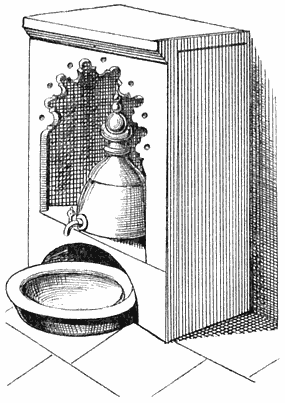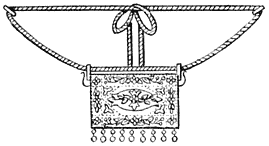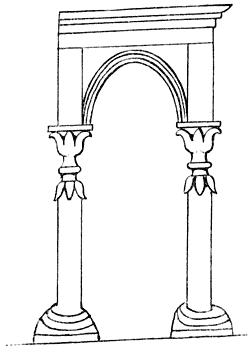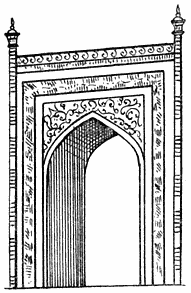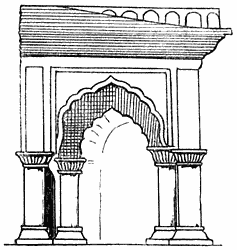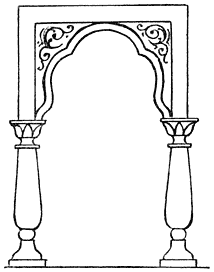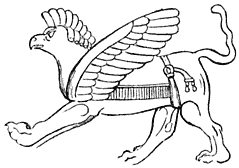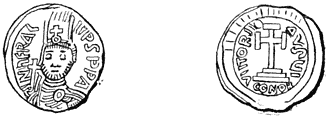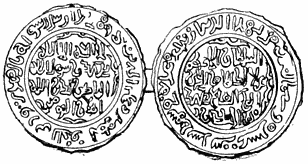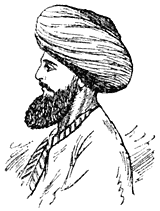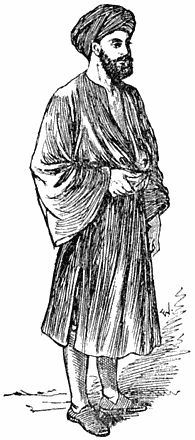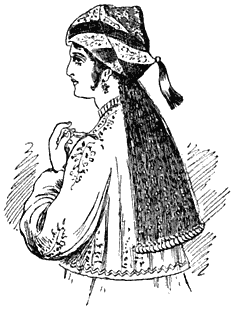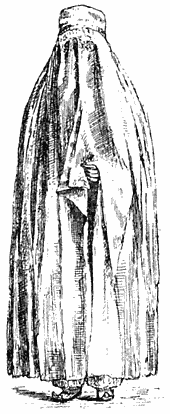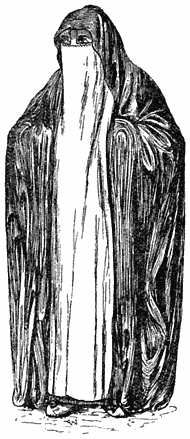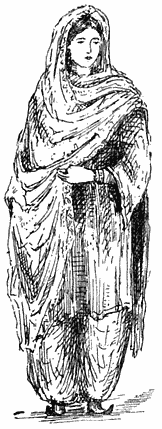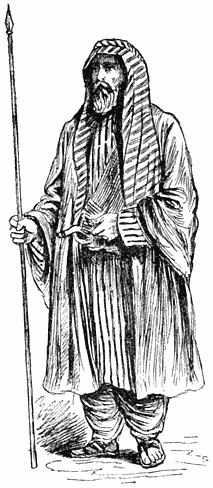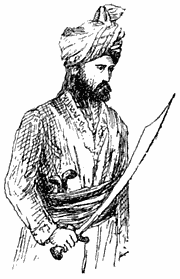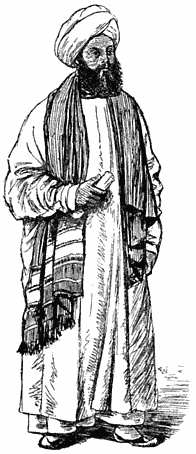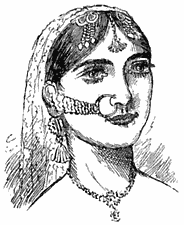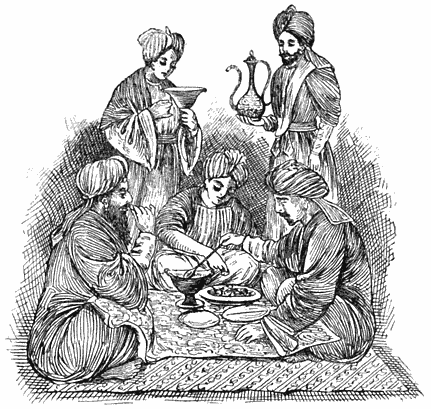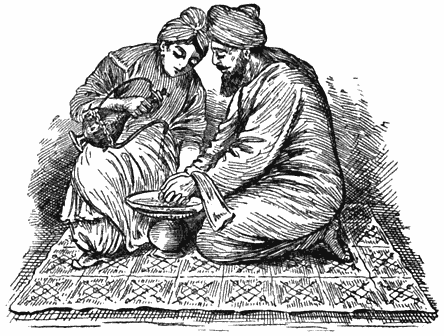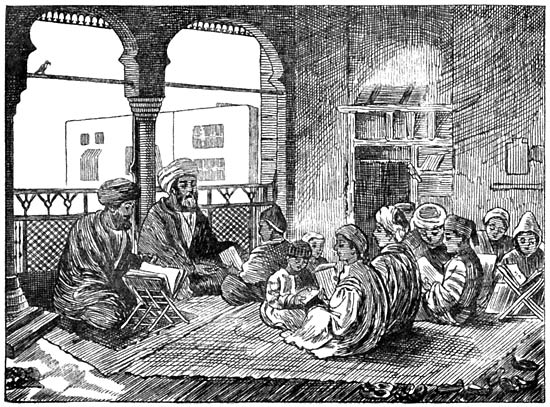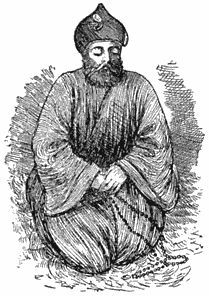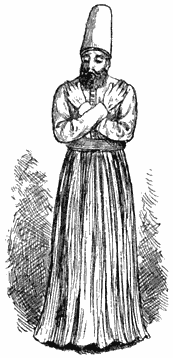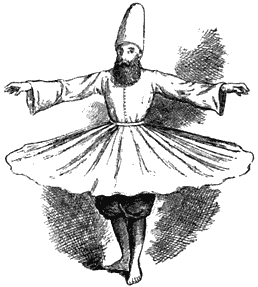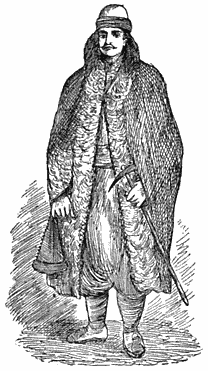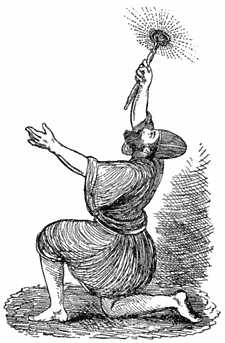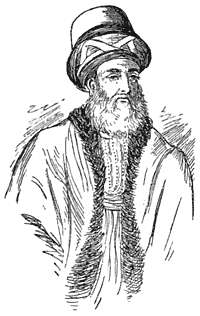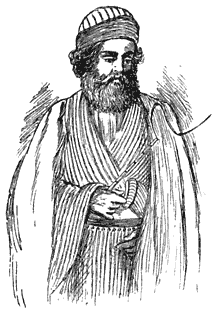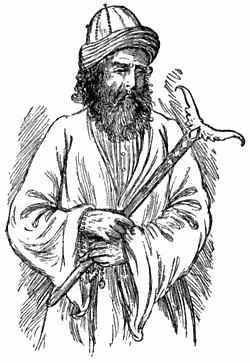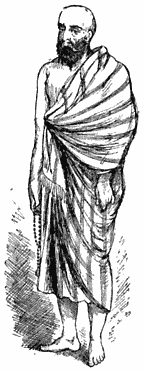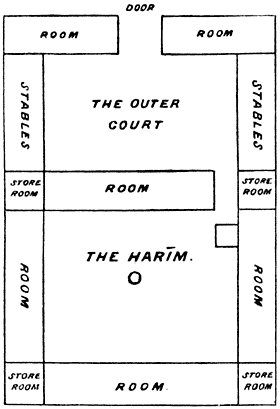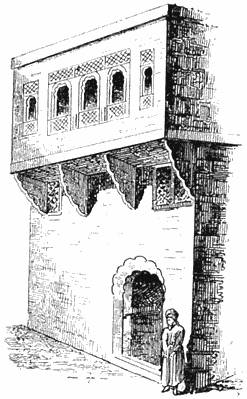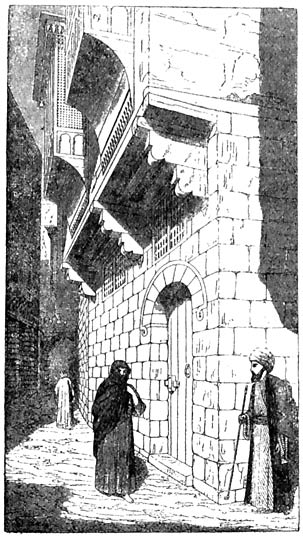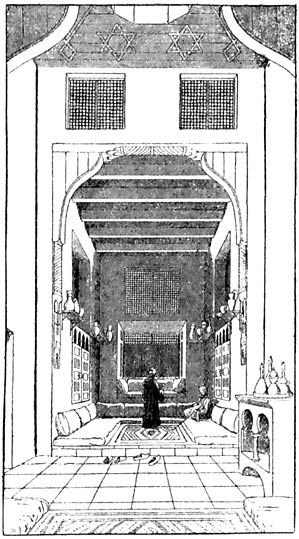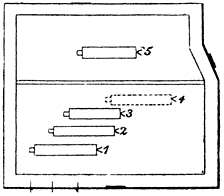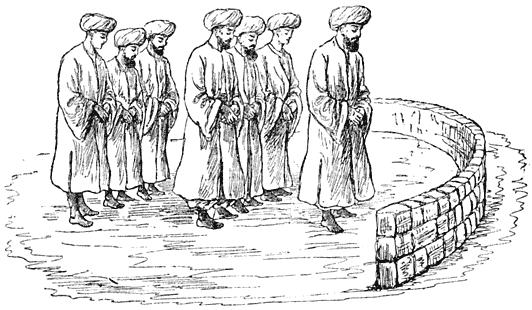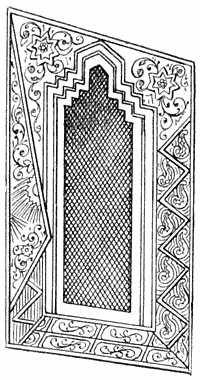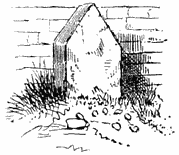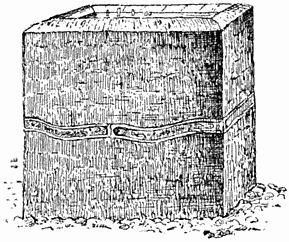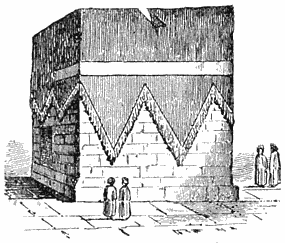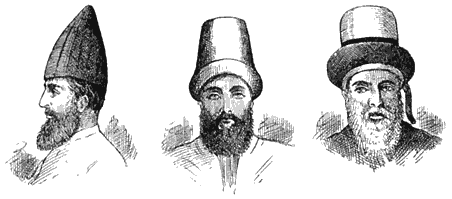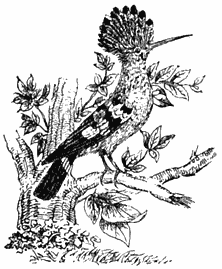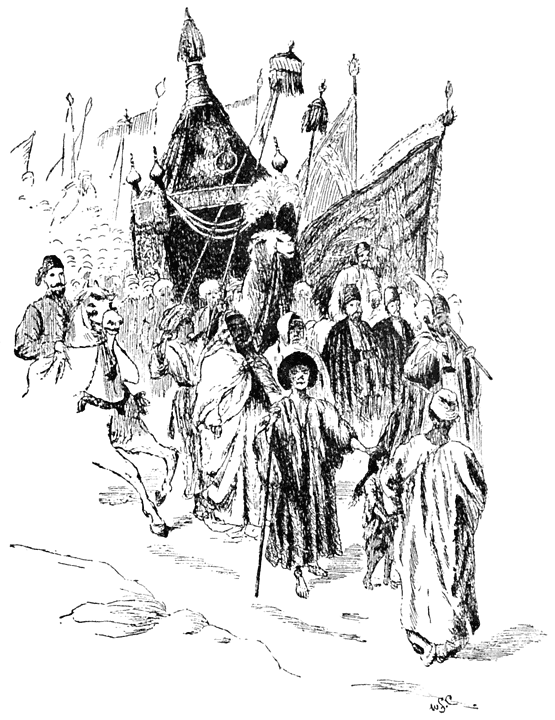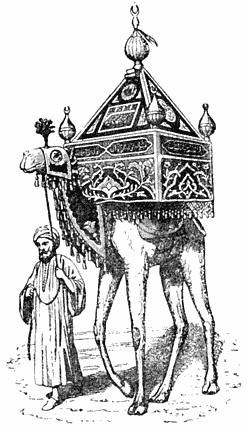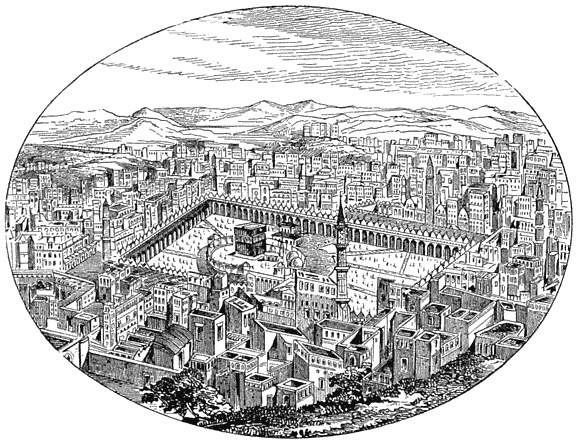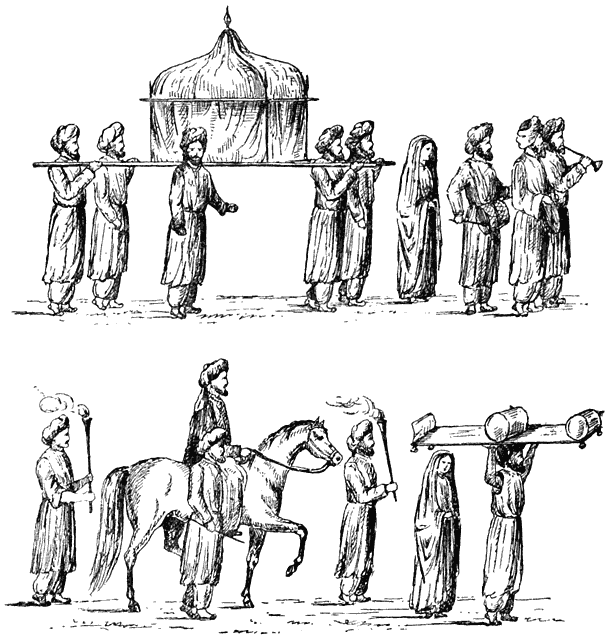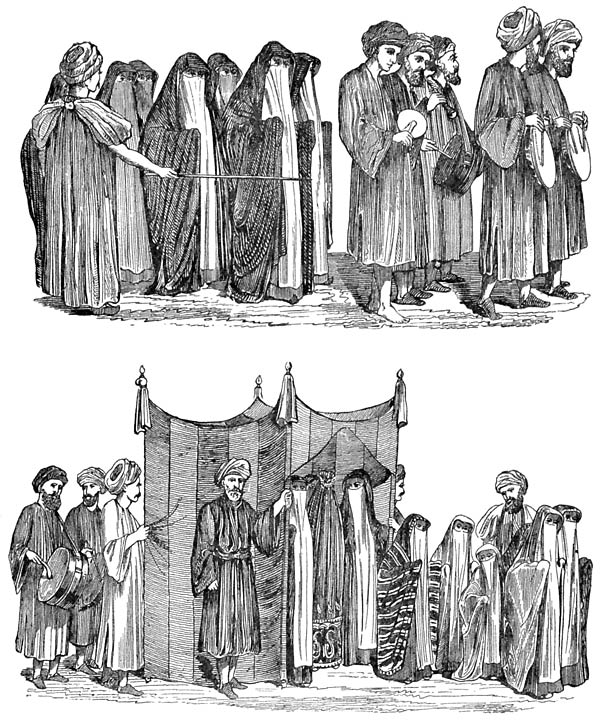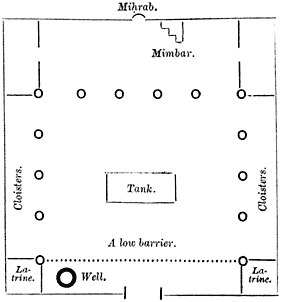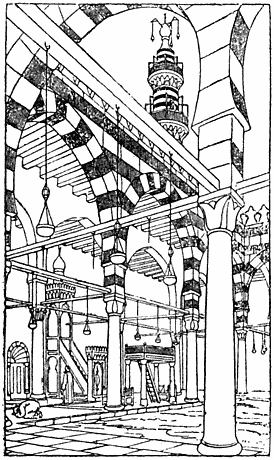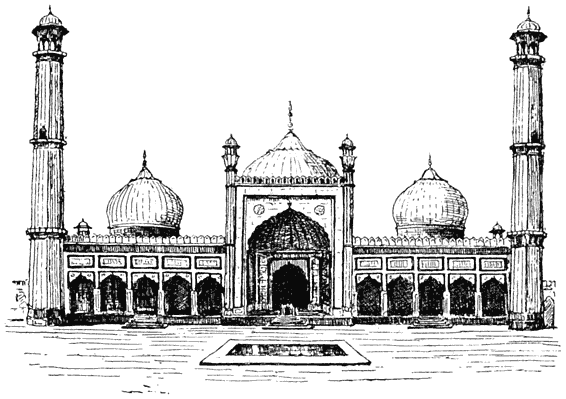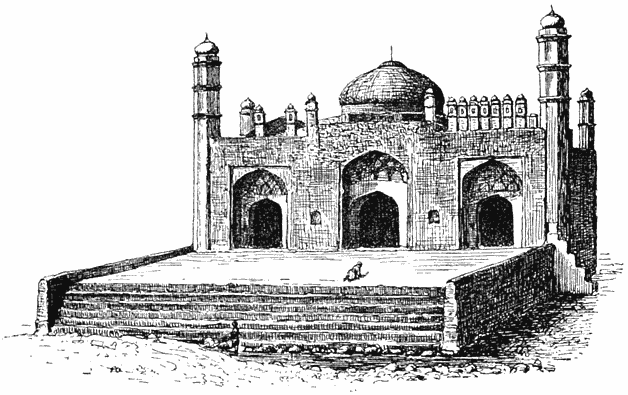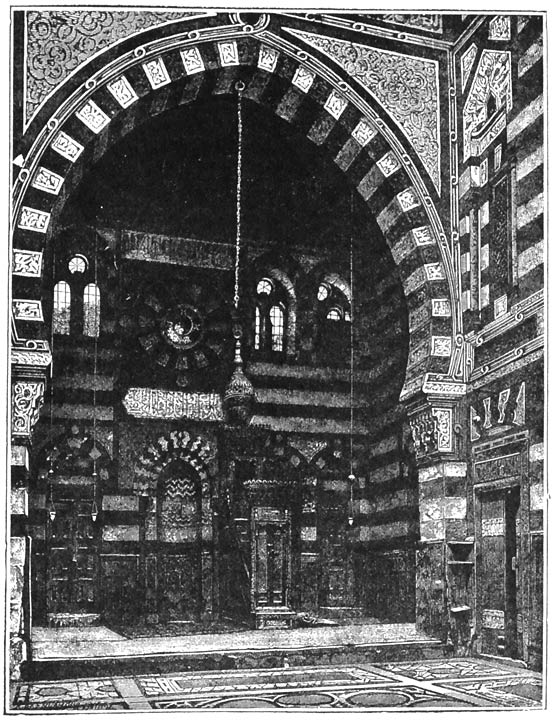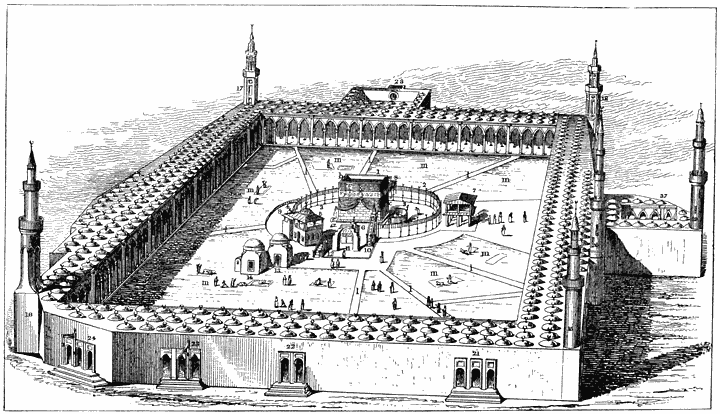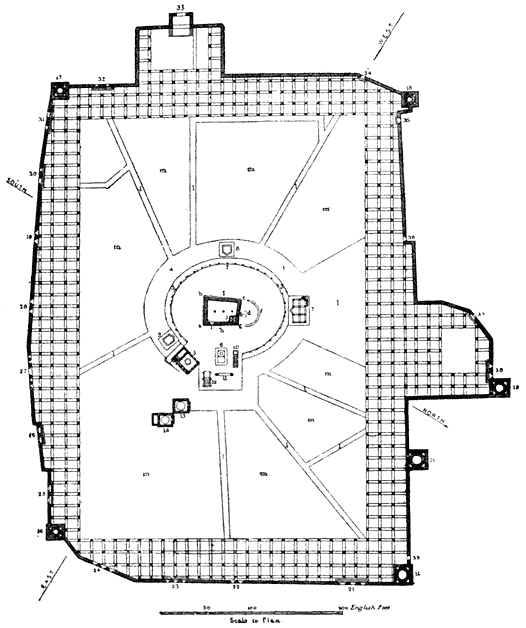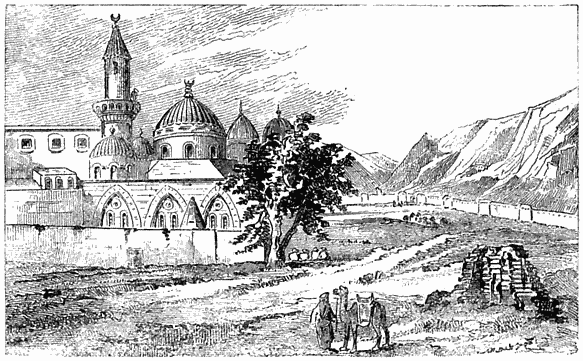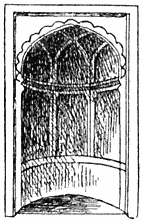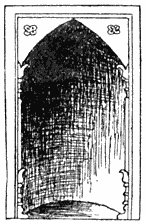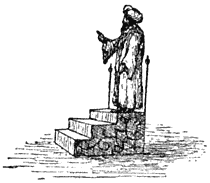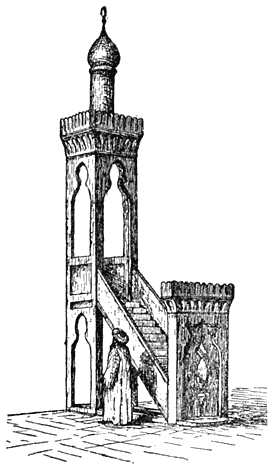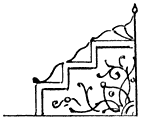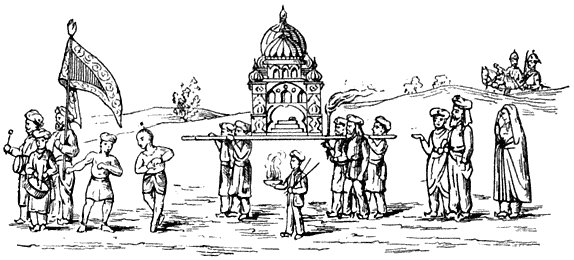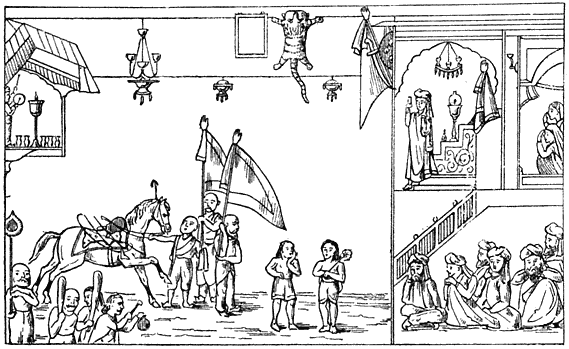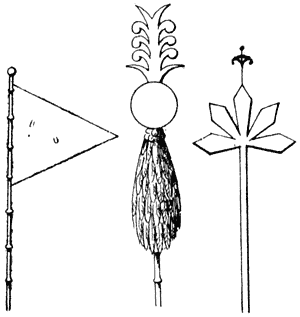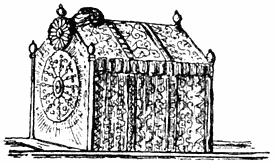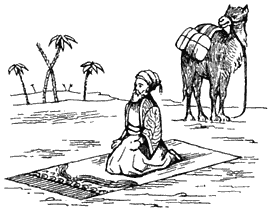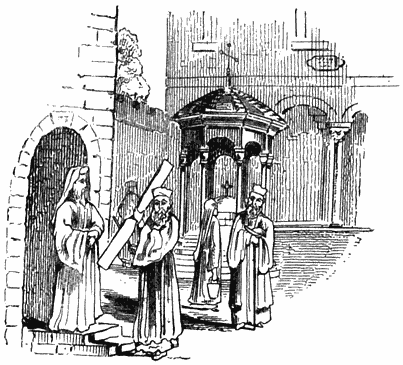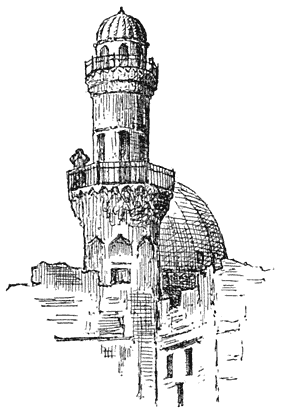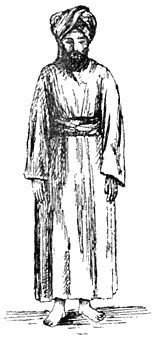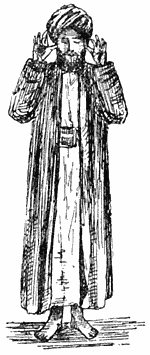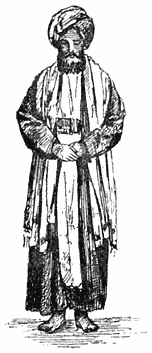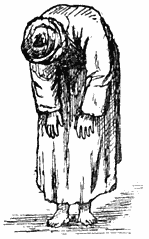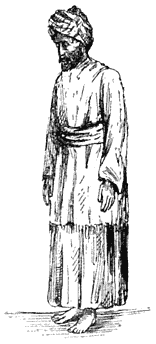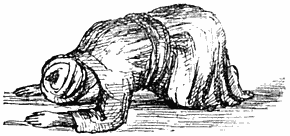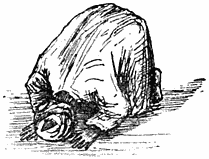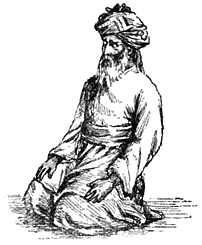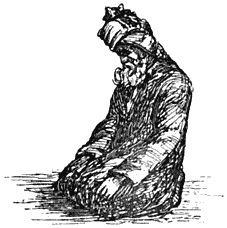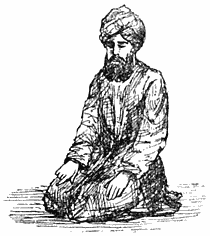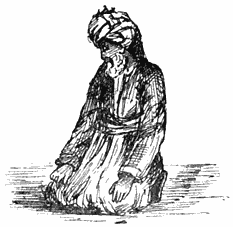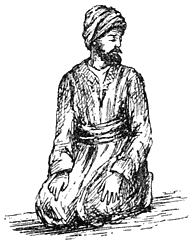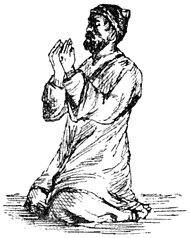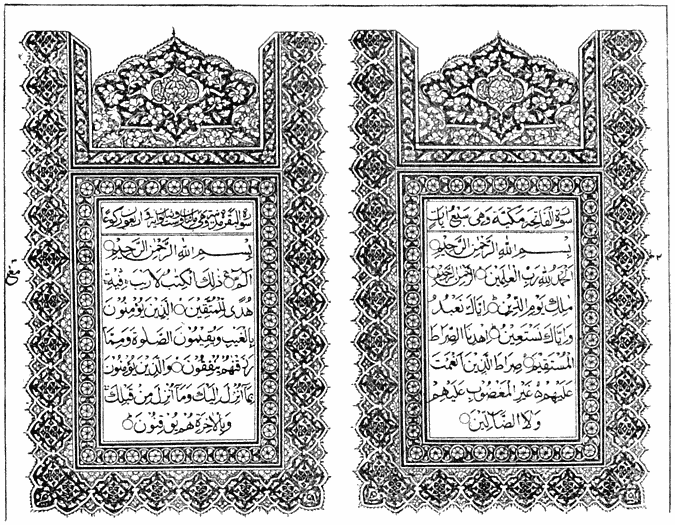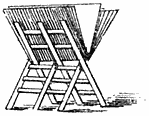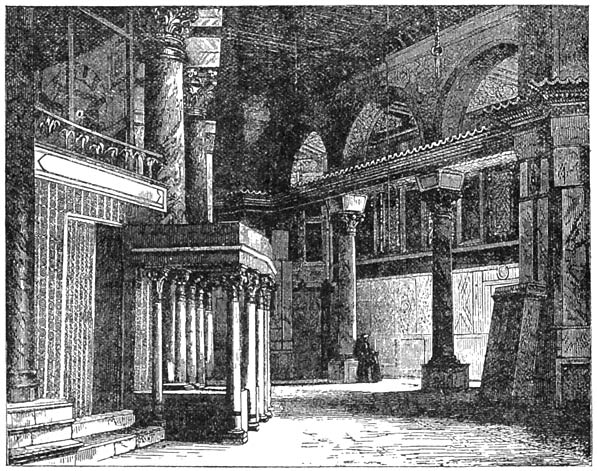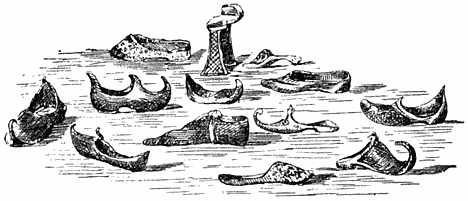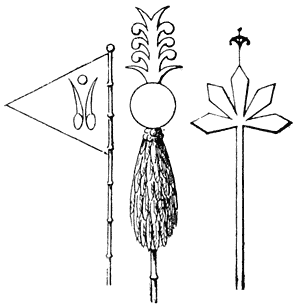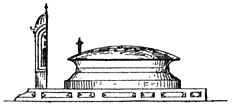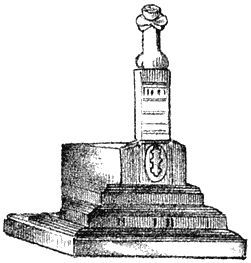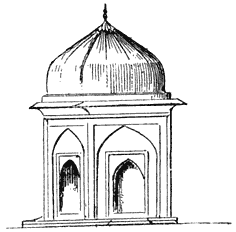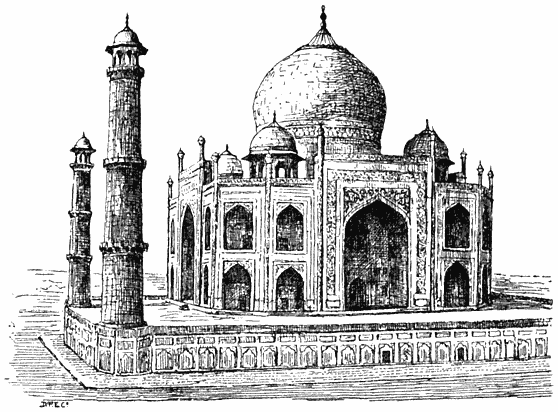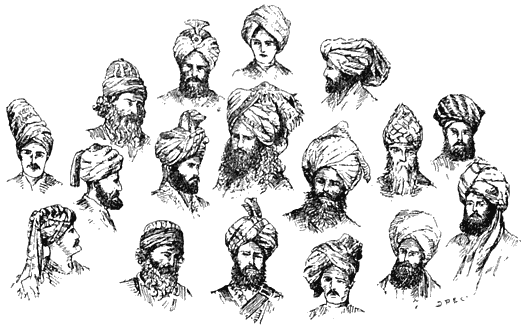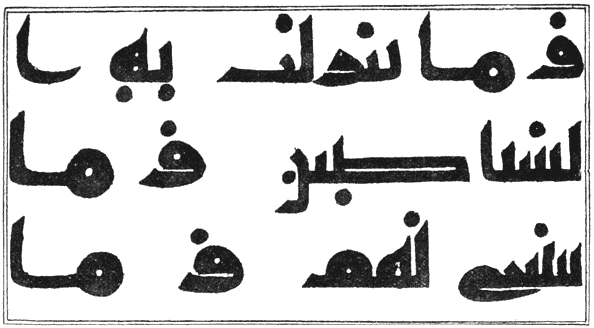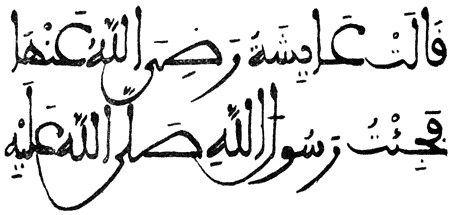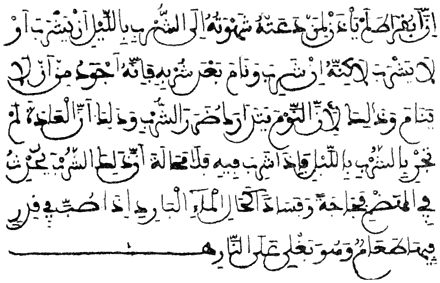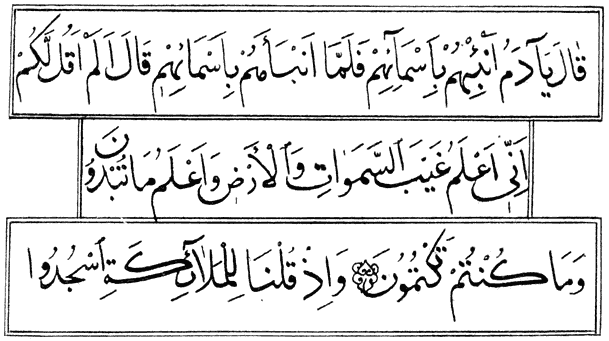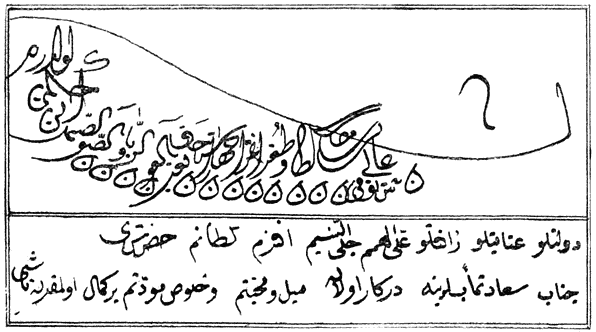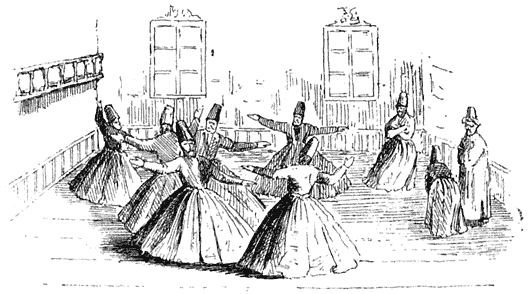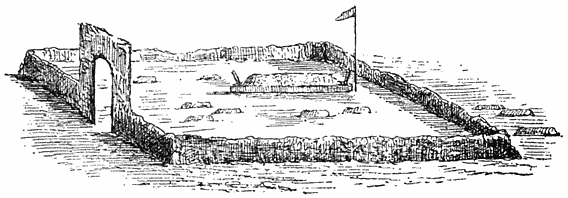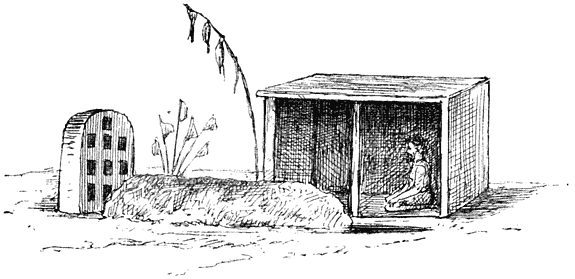MUḤAMMAD (محمد). Lit. “The Praised One.” Sometimes spelt Mohammed, Mohomed, or Mahomet.
Muḥammad, the founder of the religion generally known as Muḥammadanism, but called
by its own adherents Islām [ISLAM], was the posthumous son of ʿAbdu ʾllāh, by his wife Āminah. ʿAbdu ʾllāh belonged
to the family of Hāshim, which was the noblest tribe of the Quraish section of the
Arabian race, and said to be directly descended from Ishmael. The father of ʿAbdu
ʾllāh and the grandfather of Muḥammad, was ʿAbdu ʾl-Mut̤t̤alib, who held the high office of custodian of the Kaʿbah. [KAʿBAH.] The same year which saw the destruction of the Abyssinian invader, and formed an
epoch in the history of Arabia, known as the Era of the Elephant, on account of the
vast array of elephants the invaders brought with them, witnessed the birth of Muḥammad.
Muḥammad [368]is said to have been born about fifty-nine days after the attack of Abrahah, or on
the 12th day of the month Rabīʿu ʾl-Awwal of the first year of the Era of the Elephant, which M. Caussin de Perceval
believes to have been the fortieth year of the reign of Chosroes the Great (Kasra Anushirwan), and calculates the date to have been August 20th, A.D. 570 (see vol. i. pp. 282, 283). According to Sprenger, it was April 20th, A.D. 571. (Das Leben und die Lehre des Mohammad, vol. i. p. 138.)
Muḥammad was born at Makkah. And immediately upon his birth, his mother, Āminah,
sent a special messenger to inform ʿAbdu ʾl-Mut̤t̤alib of the news. The messenger
reached the chief as he sat within the sacred enclosure of the Kaʿbah, in the midst
of his sons and principal men, and he arose with joy and went to the house of Āminah.
He then took the child in his arms, and went to the Kaʿbah, and gave thanks to God.
The Quraish tribe begged the grandfather to name the child after some member of the
family, but ʿAbdu ʾl-Mut̤t̤alib said, “I desire that the God who has created the child
on earth may be glorified in heaven,” and he called him Muḥammad, “the praised one.”
Al-Ḥāfiz̤, on the authority of Mak͟hzūm (quoted by Abū ʾl-Fidāʾ, p. 59), says that
on the night that Muḥammad was born, the palace of Chosroes was shaken, and fourteen
of its turrets fell; the fires of the Persians were extinguished, which had not been
extinguished before for a thousand years; and the lake Sāwah sank.
It was not the custom of the better class of women amongst the Arabians to nurse their
children, and consequently the infant, soon after his birth, was made over to S̤uwaibah, a slave-girl of his uncle Abū Lahab. S̤uwaibah had a son, whose name was Masrūḥ,
whom she nursed at the same time, and she had also nursed Ḥamzāh, Muḥammad’s uncle,
and Abū Salimah; so that these three men were his foster-brothers. S̤uwaibah only
suckled Muḥammad for a few days, when the child was made over to Ḥalīmah, a woman
of the tribe of the Banū Saʿd. Ḥalīmah was the daughter of ʿAbdu ʾllāh Abū Zuʾaib,
the son of al-Ḥāris̤, and she took Muḥammad to her desert home, amongst the Banū
Saʿd, where he remained for a period of two years. The foster-brother suckled by Ḥalīmah
was ʿAbdu ʾllāh, and his foster-sisters Anīsah and Ḥarāmah.
The following story connected with Muḥammad’s stay with Ḥalīmah is related by Abū
ʾl-Fidāʾ (p. 64). When some time passed, Muḥammad and his foster-brother went out
to a distance from the house, when Ḥalīmah’s son came to his mother and said, “Two
men clothed in white raiments have taken hold of the Quraish boy, and have thrown
him down and have ripped open his belly.” So Ḥalīmah and her husband went to the
place where the child was, but found him standing on his feet. And they said, “What
has happened to thee child?” And he answered and said, “Two men came to me, and threw
me down and ripped up my belly.” Then Ḥalīmah’s husband said to her, “I greatly fear
that this boy has got the epilepsy.” So they took him to his mother Āminah. And Ḥalīmah
said to Āminah, “I am afraid he is possessed of a devil.” But Āminah said, “What in
the world can Satan have to do with my son that he should be his enemy?”
This circumstance has been regarded as the miracle when Gabriel came and took out
the heart of the child and washed it from the stains of original sin. And some commentators
say the first verse of the XCIVth Sūrah of the Qurʾān alludes to it: “Have we not opened thy breast?”
Muḥammad ever retained a most grateful recollection of the kindness he had received
from the Banū Saʿd, and, in after years, he used to say, “Verily I am the most perfect
Arab amongst you. My descent is from the Quraish, and my speech is the tongue of the
Banū Saʿd.”
In his sixth year, Muḥammad was taken by his mother to al-Madīnah, but on the return
journey she fell sick, and died at a place called al-Abwāʾ, where her body was buried.
In subsequent years, Muḥammad visited his mother’s tomb at al-Abwāʾ, and wept over
it, saying, “This is the grave of my mother; the Lord hath permitted me to visit it,
and I sought leave to pray for her salvation, but it was not granted. So I called
my mother to remembrance, and the tender memory of her overcame me, and I wept.”
The little orphan was then carried on to Makkah by Umm Aiman, who, although young
in years, became his faithful nurse and companion. The charge of Muḥammad was now
undertaken by ʿAbdu ʾl-Mut̤t̤alib, but the old chief died two years afterwards, and
the child was committed to the care of his paternal uncle, Abū T̤ālib. When Muḥammad
was twelve years old, he was taken by his uncle on a mercantile journey to Syria,
and proceeded as far as Buṣrā. The expedition lasted for some months. According to
the Muslim historian, Abū ʾl-Fidāʾ, it was at Buṣrā that Muḥammad met the Christian
monk Buḥairaʾ, who is related to have said to Abū T̤ālib, “Return with this youth,
and guard him from the hatred of the Jews; for great dignity awaits this your brother’s
son.” It was on this journey that Muḥammad was brought in contact with the profession
of Christianity in Syria, and had an opportunity of obtaining some information as
to the national and social customs of Christians. He must have also passed through
many Jewish settlements. It is, therefore, highly probable that it was on the occasion
of this journey that Muḥammad’s mind became first impressed with the absolute necessity
of reforming, not only the gross idolatry of Makkah, but the degrading social habits
of the Arabian people.
After this journey, the youth of Muḥammad seems to have been passed uneventfully,
but all authorities agree in ascribing to him a correctness of manner, and a purity
of morals, which were at that time rare amongst the [369]people of Makkah. The fair character and honourable bearing of the unobtrusive youth
won the approbation of the citizens of Makkah, and by common consent he received the
title of al-Amīn, “The Faithful.”
Between the years A.D. 580–590, the sacrilegious war broke out between the Quraish and the Banū Hawāzin,
which lasted for nearly ten years. In two of the contests, Muḥammad, though only
a lad, accompanied his uncles in their local wars. They were called “sacrilegious”
because they were carried on during the sacred months, when fighting was forbidden.
The youth of Muḥammad passed away without any other incidents of interest. At this
period he was employed, like other lads, in tending the sheep and goats of Makkah
upon the neighbouring hills and valleys. He used afterwards to allude to his shepherd
life, and say it comported with his prophetic office, even as it did with that of
Moses and David: “Verily there hath been no prophet who hath not performed the work
of a shepherd.”
When Muḥammad had reached his twenty-fifth year, on the recommendation of his uncle,
Abū T̤ālib, he entered the service of K͟hadījah, a rich widow of Makkah. She was of
the Quraish tribe, the daughter of K͟huwailid ibn Asad. With Maisarah, her servant,
Muḥammad was placed in charge of the widow’s merchandise, and he again travelled
the same route which he had traversed thirteen years before with his uncle. His journey
again extended as far as Buṣrā, a city about sixty miles to the east of the river
Jordan. He visited Aleppo and Damascus, and was doubtless brought in frequent contact
with both Jews and Christians, and had another opportunity of obtaining that superficial
acquaintance with the Jewish and Christian faiths, which enabled him in after years
to embody so much of the teaching of the Bible in the verses of the Qurʾān. “The mutual
animosity of Jew towards Christian,” says Mr. Stobart, “though they professed to worship
the true God, though they appealed to the old Testament, and both equally revered
the name of Abraham, and professed to abhor that idolatry in which he had been bred,
may have led Muḥammad to think that possibly more divine truth lay hid in both these
systems of belief, though covered and concealed by human inventions, and may have
suggested to him the possibility of forming out of these conflicting elements one
single simple catholic creed, and of thus uniting mankind in the worship and love
of the great Father of all.” (Stobart’s Islām, p. 56.)
Muḥammad having proved himself faithful in the commercial interests of his mistress,
was soon rewarded with her hand in marriage. When Muḥammad married her she was a
widow of forty years of age, and had been already twice married, and had borne to
her former husbands, two sons and a daughter. The house of Muḥammad and K͟hadījah
was a bright and happy one, and their marriage fortunate and fruitful. Two sons and
four daughters were its issue. Their eldest son was al-Qāsim, who died at the age
of two years, whence Muḥammad was sometimes called Abū ʾl-Qāsim, or the father of al-Qāsim. The other son, ʿAbdu ʾllāh, surnamed at̤-T̤āhir and at̤-T̤aiyib,
died in infancy. The four daughters were Zainab, Ruqaiyah, Umm Quls̤ūm, and Fāt̤imah.
[FATIMAH.]
During her lifetime, K͟hadījah was Muḥammad’s only wife, and he always looked back
to this period of his life with fond remembrance. When the world called him an impostor
and a cheat, K͟hadījah was the first to acknowledge him to be the “Apostle of God.”
Indeed, so much did he dwell upon the mutual love of K͟hadījah and himself, that the
envious ʿĀyishah declared herself more jealous of this rival, who was dead, than of
all the living rivals who contested with her the affection of the Prophet.
As yet Muḥammad was almost a stranger to the outside world, but he now obtained some
reputation among his fellow men, by taking a prominent part in the resuscitation of
an old league, called the Federation of the Fuẓūl [HILFU ʾL-FUZUL], formed in ancient times for the repression of acts of lawlessness within the walls
of Makkah. A new compact was formed between four or five of the chief families of
Makkah for the protection of the weak and oppressed, and Muḥammad was one of the
most prominent movers in this federation, the revival of which resulted mainly from
his efforts.
In his thirty-fifth year, he settled by his decision a grave difficulty, which had
sprung up during the reconstruction of the Kaʿbah, regarding the placing of the sacred stone, and which almost threatened
to plunge the whole of Arabia into another of their oft-recurring wars.
The Kaʿbah was too low in the building, and the Quraish wished to raise it higher,
and so they demolished it. When it was rebuilt as far as the position of the Black
Stone, the question arose, who should be the honoured instrument of raising the sacred
relic into its place, for each tribe claimed the honour. Then the oldest citizen arose
and said, “My advice is that the man who first entereth by the gate of the Banū Shaibah,
shall be selected umpire in this difficult question, or shall himself place the stone.”
The proposal was agreed upon, and the first man who entered the gate was he who was
known as al-Amīn, “The Faithful,” Muḥammad, the son of ʿAbdu ʾllāh. Muḥammad decided upon an expedient,
which served to satisfy the contending parties. The stone was placed on a cloth, and
each tribe shared in the honour of raising it, by taking hold of the cloth. The stone
being thus deposited in its proper place, the Quraish built on without interruption,
and the great idol Hubal was placed in the centre of the sacred edifice, and around
were ranged the various other idols of the Arabian people. “This circumstance,” says
Sir William Muir, “strikingly illustrates the absence of any paramount authority at
Mecca at this time. [370]A curious story is related of an attempt made about this period to gain the rule of
Mecca. The aspirant was Othmân, first cousin of Khadîja’s father. He was dissatisfied,
as the legend goes, with the idolatrous system of Mecca, and travelled to the court
of the Roman Emperor, where he was honourably entertained, and admitted to Christian
baptism. He returned to Mecca, and on the strength of an imperial grant, real or pretended,
laid claim to the government of the city. But his claim was rejected, and he fled
to Syria, where he found a refuge with the Ghassânide prince. But emissaries from
Mecca, by the aid of gifts, counteracted his authority with the prince, and at last
procured his death.”—Muir’s Life of Mahomet, new ed. p. 31.
Shortly after the rebuilding of the Kaʿbah, Muḥammad adopted ʿAlī, the son of his
friend and former guardian, Abū T̤ālib. ʿAlī was at this time only six years old.
About this period he admitted to his closest intimacy another person, unconnected
with him by family ties, but of more equal age. This was Zaid, a slave-boy belonging
to K͟hadījah, who, to gratify her husband, made him a present of the slave. Zaid was
the son of Ḥāris̤ah, of the Banū ʿUẕrah, a tribe which occupied the region of South
Syria, and had been taken captive and sold to K͟hadījah’s grandfather as a slave.
When Ḥāris̤ah heard that Muḥammad possessed Zaid, he came to Makkah and offered
a large payment for his release. Muḥammad summoned Zaid, and gave him the option
to go or stay. Zaid elected to stay, and Muḥammad, delighted with his faithfulness,
gave him his liberty, and adopted him as his son. The freed man was henceforth known
as Zaid ibn Muḥammad.
“Muḥammad was now approaching his fortieth year, and increased contemplation and
reflection engaged his mind. The idolatry and moral debasement of his people pressed
heavily upon him, and the dim and imperfect shadows of Judaism and Christianity excited
doubts without satisfying them; and his mind was perplexed with uncertainty as to
what was the true religion.” (Muir’s Life of Mahomet, new ed. p. 35.)
It is probable that it was at this time Muḥammad composed those Sūrahs of the Qurʾān
which express the anxious yearning of an inquirer rather than the more positive teaching
of an Apostle, and we would assign to this period the following verses of the Qurʾān,
which, according to Muḥammadan commentators, are admitted to be of a very early date.
(See Jalālu ʾd-dīn’s Itqān.)
Sūratu ʾl-ʿAṣr (ciii.):—
“I swear by the declining day!
“Verily, man’s lot is cast amid destruction,
“Save those who believe and do the things which be right, and enjoin truth and enjoin
each other to be patient.”
Sūratu ʾl-ʿĀdiyāt (c.):—
“By the snorting chargers!
“And those that dash off sparks of fire!
“And those that scour to the attack at morn!
“And stir therein the dust aloft;
“And cleave therein their midway through a host!
“Truly, man is to his Lord ungrateful,
“And of this he is himself a witness;
“And truly, he is vehement in the love of this world’s good.
“Ah! knoweth he not, that when that which is in the graves shall be laid bare,
“And that which is in men’s breasts shall be brought forth,
“Verily their Lord shall on that day be informed concerning them?”
Sūratu ʾl-Fātiḥah (i.):—
“Praise be to God, Lord of all the worlds,
“The compassionate, the merciful!
“King of the day of reckoning!
“Thee only do we worship, and to Thee do we cry for help.
“Guide Thou us on the straight path,
“The path of those to whom Thou hast been gracious;—with whom thou art not angry,
and who go not astray.”
The latter Sūrah is the Fātiḥah, or initial prayer, &c., often recited in public
worship, and it appears to contain, if not the very words, at all events the gist
of the daily prayer of an anxious and inquiring soul.
These Sūrahs were most probably followed by others of a similar character, being poetical
effusions rather than express enunciations of any definite teaching. For example,
Sūrahs ci., xcv., civ., xcii., xci., cvi.
Muḥammad seems to have employed himself in such meditations as find expression in
these Sūrahs, some years before he assumed the office of a divine teacher, for it
was but slowly and by degrees that he was led on to believe that he was really called
of God, to preach a reformation both to his own people and to all mankind.
Bewildered by his own speculations amidst uncertain flickerings of spiritual light,
Muḥammad spent some time in retirement, and in the agonies of distress repeatedly
meditated suicide. Perplexed with the mysterious destiny of man and the failure of
repeated revelations, he would fall into ecstatic reveries, and it was during one
of these seasons of retirement, in the cave of Ḥirāʾ, that he believed an angel appeared
to him in a dream, and that the first revelation came. According to the traditions
collected by al-Buk͟hārī and Muslim (see Arabic edition, as Matthew’s translation
in the Mishkāt is defective in several very important particulars), the first communication was
made to Muḥammad in a dream.
ʿĀyishah relates: “The first revelations which the Prophet of God received were in
true dreams. He never dreamed but it came to pass as regularly as the dawn of day. After this the Prophet went into retirement, and he used to seclude himself in a
cave in Mount Ḥirāʾ, and worship there day and night. He would, whenever he wished,
return to his family at Makkah, and then go back again, taking with him the necessaries
of life. Thus he continued to return to K͟hadījah from time to time, until one day
the revelation [371]came down to him, and the angel (Malak) came to him and said, ‘Read’ (iqraʾ); but the Prophet said, ‘I am not a reader.’ And the Prophet related that the angel
took hold of him, and squeezed him as much as he could bear, and then said again,
‘Read’; and the Prophet said, ‘I am not a reader.’ Then the angel took hold of him
a second time, and squeezed him as much as he could bear, and then let him go, and
said, ‘Read’; then the Prophet said, ‘I am not a reader.’ Then the angel again seized
the Prophet, and squeezed him, and said:—
‘Read thou, in the name of thy Lord who created;—
‘Created man out of clots of blood:—
‘Read thou! For thy Lord is the most Beneficent,
‘Who hath taught the use of the pen;—
‘Hath taught man that which he knoweth not.’
(See Qurʾān, Sūratu ʾl-ʿAlaq (xcvi.), the first five verses.)
“Then the Prophet repeated the words with a trembling heart. And he returned (i.e. from Ḥirāʾ to Makkah) to K͟hadījah, and said, ‘Wrap me up, wrap me up.’ And they
wrapped him up in a garment until his fear was dispelled; and he told K͟hadījah what
had occurred, and he said to K͟hadījah, ‘I was afraid I should die.’ Then K͟hadījah
said, ‘No, it will not be so, I swear by God. He will never make thee melancholy or
sad. For you are kind to your relatives, you speak the truth, you are faithful in
trust, you bear the afflictions of the people, you spend in good works what you gain
in trade, you are hospitable, and you assist your fellow men.’ After this K͟hadījah
took the Prophet to Waraqah, who was the son of her uncle, and said to him, ‘O son
of my uncle, hear what your brother’s son says to you.’ Then Waraqah said to the Prophet,
‘O son of my uncle, what do you see?’ Then the Prophet told Waraqah what he had seen;
and Waraqah said, ‘This is the Nāmūs [NAMUS] which God sent to Moses. O would to God I were young in this time! and would to
God I were living at the time of your people turning you out!’ The Prophet said, ‘Will
my people turn me out?’ And Waraqah said, ‘Yes. No man has ever come as you have come,
and not been held in enmity; but if I should live to that day, I will give you great
help.’ Waraqah soon died, and after that the revelation ceased (i.e. for a time).”
The first vision was followed by a considerable period, during which no further revelation
was given, and during which Muḥammad suffered much mental depression. [FITRAH.]
“During this period,” al-Buk͟hārī says, “the Prophet was very sorrowful, so much so
that he wished to throw himself from the top of a hill to destroy himself.”
But after a lapse of time, as he was wrapped up in his garments and lay stretched
upon his carpet, the angel is said to have again addressed him, in the chapter which
begins (Sūrah lxxiv.):—
“O thou enwrapped in thy mantle,
Arise and preach!”
Muḥammad then believed himself to be a commissioned Apostle, the messenger and the
prophet of God, sent to reclaim a fallen people to the knowledge and service of their
God. His revelations were God’s Book, and his sayings the utterances of inspiration.
The first convert to Islām was his faithful wife K͟hadījah, the two next, ʿAlī and
Zaid, his adopted children, and afterwards his old trusted friend, Abū Bakr, “the
True.” Then followed ʿUs̤mān, who was a grandson of ʿAbdu ʾl-Mut̤t̤alib; T̤alḥah,
the renowned warrior of after days; and ʿAbdu ʾr-Raḥmān, a merchant of some consequence.
The new converts soon numbered some fifty souls, either members of the Prophet’s family
or his dearest friends.
An important change now occurred in the relations of Muḥammad with the citizens of
Makkah. Their hostility was aroused, and the Muslims were subjected to some persecution
and indignity. It was not, however, until some three years of his ministration had
elapsed that any general opposition was organized. Hostility once excited soon showed
itself in acts of violence. Saʿīd, a youthful convert, was attacked whilst leading
a party of Muslims in prayer. He defended himself, and struck one of his opponents
with a camel goad. It was, says Sir William Muir, “the first blood spilt in the cause
of Islām.”
In the fourth year of his mission, Muḥammad took possession of the house of Arqam
(a recent convert), and there held meetings for those who wished to know the teaching
of the Prophet more perfectly.
The house of Arqam was in front of the Kaʿbah, and was therefore in a convenient position.
So famous did it become as the birth-place of believers, that it was afterwards styled
the “House of Islām.”
As the number of believers increased, so did the enmity of the persecutor, and in
order to escape the danger of perversion, Muḥammad recommended such of his followers
who were without protection to seek an asylum in a foreign land. Eleven men, accompanied
by their families, set out for the port of Shueiba, where, finding two vessels about
to sail, they embarked in haste, and were conveyed to Abyssinia.
Here they met with a kind reception from the Negus, or king, and their period of exile
was passed in peace and comfort. This is termed the first hijrah, or “flight,” to Abyssinia, as distinguished from the later and more extensive emigration
to the same land. In three months the refugees returned to Makkah.
About this time a strange episode occurred, in which Muḥammad sought a compromise
with his people, by admitting their gods into his system as intercessors with the
Supreme Being. While the Quraish sat beneath the Kaʿbah, he recited the following
Sūrah as an inspired message (liii.):—
“And see ye not Lāt and ʿUzzā,
And Manāt the third besides? [372]
These are exalted females,
And verily their intercession is to be hoped for.”
The idolaters were reconciled, and bowed before the God of Muḥammad. But his heart
smote him, and not long after the obnoxious lines (those in italics) were said to
be recalled by Gabriel, as suggested by the Evil One, and there was substituted the
uncompromising denunciation of idolatry, from which he never after swerved:—
“What! shall there be male progeny unto you, and females unto him?
“That indeed were an unjust partition.
“They are naught but names which ye and your fathers have invented.”
In the sixth year of his mission, the cause of Muḥammad was strengthened by the accession
of two powerful citizens, Ḥamzah and ʿUmar. Ḥamzah was the uncle and also the foster-brother
of the Prophet, a man of distinguished bravery, whose heroism earned for him the title
of the “Lion of God.” ʿUmar was a bold impulsive spirit, the very man needed to give
strength to a cause, one who in a remarkable manner left the impress of his character
upon the religious system he embraced. He succeeded Abū Bakr in the K͟halīfate, and
left the stamp of his fierce warlike spirit upon Islām. [UMAR.]
Alarmed at the bold part which Muḥammad and his followers were now able to assume,
the Quraish formed a hostile confederacy, by which all intercourse with the Muslims
and their supporters was suspended. The severity of the ban at last overreached its
object, for the sympathies of the people were enlisted by their privation in favour
of Muḥammad and his followers. The interdict was cancelled and the Hāshimites restored
to freedom.
In the beginning of the tenth year of his mission, and in the fiftieth of his life,
Muḥammad lost his faithful and devoted wife K͟hadījah. For twenty-five years she
had been his counsellor and support, and his grief at her death at first was inconsolable.
She was sixty-five years old when she died. Abū T̤ālib, the Prophet’s uncle and guardian,
died a few weeks afterwards. His conversion to Islām is a matter of uncertainty. Within
two months of the death of K͟hadījah (who was his only wife during her lifetime),
the Prophet married Saudah, the widow of one of the Abyssinian emigrants, and also
betrothed himself to ʿĀyishah, the daughter of his friend Abū Bakr, then but a girl
of seven years.
Abū T̤ālib had hardly been buried a fortnight when Muḥammad, followed only by his
faithful attendants, set out on an adventurous mission to at̤-T̤āʾif, a place sixty
miles to the east of Makkah, and the nearest city of importance. He went first to
the three principal men of the city, and explained the object of his mission, and
invited them to the honour of supporting him in sustaining the new faith. But he failed
in producing conviction. Muḥammad remained at at̤-T̤āʾif ten days, but with no success.
The mob, stirred up to hasten the departure of the unwelcome visitor, hooted at him
in the streets, and pelted him with stones, and at last compelled him to flee out
of the city. They chased him fully two miles across the sandy plain, until wearied
and mortified, he took refuge for the night in a neighbouring garden, where he spent
some time in earnest prayer. (Muir, 2nd ed., p. 114.)
Reinvigorated by the rest, he set forth on the return journey to Makkah.
Repulsed from at̤-T̤āʾif, and utterly hopeless at home, the fortunes of Muḥammad
seemed dark, but hope dawned at last from an unexpected quarter. At the yearly pilgrimage,
a little group of worshippers from al-Madīnah was attracted and won over at Minā by
the preaching of Islām, joined his mission, and the following year they met Muḥammad
and took the oath of allegiance which is known as the first Pledge of ʿAqabah. This little party consisted of twelve men, ten were of the K͟hazraj and two of the
Aus tribe. They plighted their faith to Muḥammad as follows:—“We will not worship
any but one God, we will not steal, neither will we commit adultery, nor will we kill
our children; we will not slander in anywise; and we will obey the Prophet in everything
that is just.”
At al-Madīnah the claims of the new Prophet found a ready response. A teacher was
deputed from Makkah to al-Madīnah, and the new faith spread with marvellous rapidity.
The hopes of Muḥammad were now fixed on al-Madīnah, visions of his journey northwards
doubtless flitted before his imagination and the musing of the day, reappeared in
his midnight slumbers.
He dreamed that he was swiftly carried by Gabriel on a winged steed past al-Madīnah
to the Temple of Jerusalem, where he was welcomed by the former Prophets all assembled
in solemn conclave. From Jerusalem he seemed to mount upwards, and to ascend from
one heaven to another, until he found himself in the awful presence of his Maker,
who dismissed him with the order that he should command his followers to pray five
times a day. [MIʿRAJ, BURAQ.]
When the time of pilgrimage again arrived, Muḥammad found himself surrounded by an
enthusiastic band of seventy disciples from al-Madīnah, who in a secret defile at
Minā plighted their faith, the second Pledge of ʿAqabah, whereby they promised to receive and defend the Faith at the risk of their own lives.
After this Muḥammad determined to quit Makkah, and the command was given, “Depart
unto al-Madīnah, for the Lord hath verily given you brethren in that city, and a house
in which ye may find refuge.” And so, abandoning house and home, the Muslims set out
secretly in little parties for al-Madīnah, where the numbers soon reached to about
one hundred and fifty, counting women and children. Muḥammad, with Abū Bakr and ʿAlī,
with their families, were left almost alone in Makkah. The Quraish held a council,
and determined to slay Muḥammad; but [373]being warned of their designs, he escaped to Mount S̤aur, near Makkah, where he hid
himself three days in a cave, and after three more days he reached al-Madīnah.
The day of his flight, or hijrah, marks the Muḥammadan era, or Hegira. The date of the flight was the 4th of Rabīʿu
ʾl-Awwal, and by the calculations of M. Caussin de Perceval, the 20th of June, A.D. 622. [HIJRAH.]
The flight to al-Madīnah changes the scene, and with it the character of the portions
of the Qurʾān revealed there. He who at Makkah is the admonisher and persuader, at
al-Madīnah is the legislator and the warrior, and the verses of the Qurʾān assume
a more didactic tone. Poetry makes way for prose, and he openly assumes the office
of a public warner and prophet.
The idolaters of Makkah disappear and their place is taken by the hypocrites [MUNAFIQUN] of al-Madīnah. Here at al-Madīnah there was no opposition to Muḥammad and his doctrines;
but, nevertheless, an undercurrent of disaffection prevailed. The head of the party
was ʿAbdu ʾllāh ibn Ubaiy, who, but for the new turn in the fortunes of the city was
on the point of being its chief. These disaffected citizens, the munāfiqūn, or “hypocrites,” as they are called, continued to be the objects of bitter denunciation
in the Qurʾān till near the close of the Prophet’s career. But before the success
of Islām they too vanish from the scene.
The first year of Muḥammad’s residence at al-Madīnah was chiefly occupied in building
the great mosque [MASJIDU ʾN-NABI], and in providing houses for himself and his followers. In a short time he became
the recognised chief of the city. The mosque and the houses were finished within seven
months of Muḥammad’s arrival. About the middle of the winter he left the house of
Abū Aiyūb, with whom he had been staying, and installed Saudah in her new residence.
Shortly afterwards he celebrated his nuptials with ʿĀyishah, who, though she had been
three years affianced, was but a girl of ten years.
Thus, at the age of fifty-three, a new phase commenced in the life of Muḥammad. Hitherto
limiting himself to a single wife, he had shunned the indulgence, but he now surrounds
himself with the cares and discord of polygamy. The unity of his family was now broken, never again to be restored.
Thenceforward his love was to be claimed, his attentions shared by a plurality of
wives, and his days spent between their houses, for Muḥammad had no separate apartments
of his own.
Those Muslims who had left Makkah with the Prophet and settled in al-Madīnah, were
now known as the Refugees [MUHAJIRUN] whilst those who embraced the faith at al-Madīnah, were designated the Assistants
or Allies [ANSAR]. Both these names in time became titles of distinguished honour.
In the second year of the Ḥijrah, Muḥammad commenced hostilities against the Quraish,
and the first pitched battle took place at Badr. With an army of 305 followers, of
whom two-thirds were citizens of al-Madīnah, Muḥammad routed a force three times
the number. The following graphic description of the battle of Badr is given by Sir
William Muir. (New ed. p. 230.)
“The valley of Badr consists of a plain, with steep hills to the north and east; on
the south is a low rocky range; and on the west rise a succession of sandy hillocks.
A rivulet, rising in the inland mountains, runs through the valley, producing along
its course numerous springs, which here and there were dug into cisterns for the accommodation
of travellers. At the nearest of these springs, the army of Mahomet halted. Habâl,
a citizen of Medîna, advised him to proceed onwards. ‘Let us go,’ he said, ‘to the
farthest spring, on the side of the enemy. I know a never-failing fountain of sweet
water there; let us make that our reservoir, and destroy the other wells.’ The advice
was good. It was at once adopted, and the command of the water thus secured.
“The night was drawing on. So they hastily constructed near the well a hut of palm
branches, in which Mahomet and Abu Bakr slept. Sâd ibn Muâdz (Saʿd ibn Muʿāẕ) kept
watch by the entrance with his drawn sword. It rained during the night, but more heavily
towards the camp of the Coreish. The Moslim army, wearied with its long march, enjoyed
sound and refreshing sleep. The dreams of Mahomet turned upon his enemies, and they
were pictured to his imagination as a weak and contemptible force.
“In the morning he drew up his little army, and, pointing with an arrow which he held
in his hand, arranged the ranks. The previous day he had placed the chief banner,
that of the Refugees, in the hands of Musâl, who nobly proved his right to the distinction.
The Khazrajite ensign was committed to Hobâb; that of the Bani Aus, to Sâd ibn Muâdz.
“Meanwhile, dissension again broke out in the camp of the Coreish, on the policy of
fighting against their kinsmen. Shaiba and Otba (ʿUtbah), two chiefs of rank, influenced,
it is said, by their slave Addâs (the same who comforted the Prophet on his flight
from Tâyif), strongly urged that the attack should be abandoned. Just then, Omeir,
a diviner by arrows, having ridden hastily round the valley, returned to report the
result of his reconnaissance. ‘Ye Coreish,’ he said, after telling them his estimate of the enemy’s number, ‘calamities
approach you, fraught with destruction. Inevitable death rideth upon the camels of
Yathreb (Yas̤rib). It is a people that hath neither defence nor refuge but in their
swords. They are dumb as the grave; their tongues they put forth with the serpent’s
deadly aim. Not a man of them shall we kill, but in his stead one of ourselves also
will be slain; and when there shall have been slaughtered amongst us a number equal
unto them, of what avail will life be to us after that?’ These words began to produce
a pacific effect, when Abu Jahl, as before, loudly opposed the proposals for peace.
Turning [374]to Amir the Hadhramite, he bade him call to mind the blood of his brother slain at
Nakhla. The flame was rekindled. Amir threw off his clothes, cast dust upon his body,
and began frantically to cry aloud his brother’s name. The deceased had been a confederate
of the family of Shaiba and Otba (ʿUtbah). Their pride and honour were affected. They
saw that thoughts of peace must now be scattered to the winds; and they resolved signally
to vindicate themselves from the imputation of cowardice cast on them by Abu Jahl.
The army was drawn up in line. The three standards for the centre and wings were borne,
according to ancient privilege, by members of the house of Abd al Dar. They moved
forward but slowly over the intervening sand-hills, which the rain had made heavy
and fatiguing. The same cause, acting with less intensity, had rendered the ground
in front of Mahomet lighter and more firm to walk upon. The Coreish laboured under
another disadvantage; they had the rising sun before them, while the army of Medîna faced the west.
“Mahomet had barely arrayed his line of battle, when the advanced column of the enemy
was discerned over the rising sands in front. Their greatly superior numbers were
concealed by the fall of the ground behind, and this imparted confidence to the Moslems.
But Mahomet was fully alive to the critical position. The fate of Islam hung upon
the issue of the approaching battle. Followed by Abu Bakr, he hastened for a moment
into the little hut, and raising his hands, poured forth these earnest petitions,
‘O Lord, I beseech Thee, forget not Thy promise of assistance and of victory. O Lord!
if this little band be vanquished, idolatry will prevail, and the pure worship of
thee cease from off the earth!’ ‘The Lord,’ said Abu Bakr, comforting him, ‘will surely
come to thine aid, and will lighten thy countenance with the joy of victory.’
“The time for action had arrived. Mahomet again came forth. The enemy was already
close; but the army of Medîna remained still. Mahomet had no cavalry to cover an advance,
and before superior numbers he must keep close his ranks. Accordingly the Prophet
had strictly forbidden his followers to stir till he should give the order for advance;
only they were to check any flank movement of the Coreish by the discharge of arrows.
The cistern was guarded as their palladium. Certain desperate warriors of the Coreish
swore that they would drink water from it, destroy it, or perish in the attempt. Scarcely
one returned from the rash enterprise. With signal gallantry, Aswad advanced close
to the brink, when a blow from Hamza’s sword fell upon his leg, and nearly severed
it from his body. Still defending himself, he crawled inwards and made good his vow;
for he drank of the water, and with his remaining leg demolished part of the cistern
before the sword of Hamza put an end to his life.
“Already, after the fashion of Arabian warfare, single combats had been fought at
various points, when the two brothers Shaiba and Otba, and Walîd the son of Otba,
still smarting from the words of Abu Jahl, advanced into the space between the armies,
and defied three champions from the army of Mahomet to meet them singly. Three citizens
of Medîna stepped forward; but Mahomet, unwilling either that the glory or the burden
of the opening conflict should rest with his allies, called them back; and, turning
to his kinsmen said: ‘Ye sons of Hâshim! arise and fight, according to your right.’
Then Obeida (ʿUbaidah), Hamza, and Ali, the uncle and cousins of the Prophet, went
forth. Hamza wore an ostrich feather in his breast, and a white plume distinguished
the helmet of Ali. But their features were hid by their armour. Otba, therefore, not
knowing who his opponents might be, cried aloud, ‘Speak, that we may recognise you!
If ye be equals, we shall fight with you.’ Hamza answered, ‘I am the son of Abd al
Muttalib—Hamza, the Lion of God, and the Lion of His Prophet.’ ‘A worthy foe,’ exclaimed Otba; ‘but who are these others with thee?’ Hamza repeated their names. Otba replied,
‘Meet foes, every one!’
“Then Otba called to his son Walîd, ‘Arise and fight.’ So Walîd stepped forth and
Ali came out against him. They were the youngest of the six. The combat was short;
Walîd fell mortally wounded by the sword of Ali. Eager to avenge his son’s death,
Otba hastened forward, and Hamza advanced to meet him. The swords gleamed quick, and
again the Coreishite warrior was slain by the Moslim lion. Shaiba alone remained of
the three champions of Mecca; and Obeida, the veteran of the Moslems, threescore years
and five, now drew near to fight with him. Both being well advanced in years, the
conflict was less decisive than before. At last, Shaiba dealt a sword-cut on the leg
of Obeida with such force as to sever the tendon, and bring him to the ground. Seeing
this, Hamza and Ali both rushed on Shaiba and despatched him. Obeida survived but
for a few days, and was buried on the march back at Safra.
“The fate of their champions was ominous for the Coreish, and their spirits sank.
The ranks began to close, with the battle-cry on the Moslem side of, ‘Ye conquerors,
strike!’ and the fighting became general. But there were still many of those scenes
of individual bravery which characterise the irregular warfare of Asiatic armies,
and often impart to them a Homeric interest. Prodigies of valour were exhibited on
both sides; but the army of the Faithful was borne forward by an enthusiasm which
the half-hearted Coreish were unable to withstand.
“What part Mahomet himself took in the battle is not clear. Some traditions represent
him moving along the ranks with a drawn sword. It is more likely (according to others)
that he contented himself with inciting his followers by the promise of divine assistance,
and by holding out the prospect of Paradise to those who fell. The spirit of Omeir, a [375]lad of but sixteen years, was kindled within him as he listened to the Prophet’s words.
Tradition delights to tell of the ardour with which the stripling threw away a handful
of dates which he was eating. ‘Is it these,’ he exclaimed, ‘that hold me back from
Paradise? Verily I will taste no more of them until I meet my Lord!’ With such words,
he drew his sword, and, casting himself upon the enemy, soon obtained the fate he
coveted.
“It was a stormy wintry day. A piercing blast swept across the valley. ‘That,’ said
Mahomet, ‘is Gabriel with a thousand angels flying as a whirlwind at our foe.’ Another,
and yet another blast:—it was Michael, and after him, Seraphîl, each with a like angelic
troop. The battle raged. The Prophet stooped, and lifting a handful of gravel, cast
it towards the Coreish, and cried, ‘Confusion seize their faces!’ The action was well
timed. The line of the Coreish began to waver. Their movements were impeded by the
heavy sands on which they stood; and, when the ranks gave way, their numbers added
but confusion. The Moslems followed eagerly on their retreating steps, slaying or
taking captive all that fell within their reach. Retreat soon turned into ignominious
flight. The Coreish, in their haste to escape, cast away their armour and abandoned
their beasts of burden with the camp and equipage. Forty-nine were killed, and about
the same number taken prisoners. Mahomet lost only fourteen, of whom eight were citizens
of Medîna, and six Refugees.
“Many of the principal men of the Coreish, and some of Mahomet’s bitterest opponents,
were slain. Chief amongst these was Abu Jahl. Muâdz brought him to the ground by a
blow which cut his leg in two. Muâdz, in his turn, was attacked by Ikrima (ʿIkrimah),
the son of Abu Jahl, and his arm nearly severed from his shoulder. As the mutilated
limb hanging by the skin impeded his action, Muâdz put his foot upon it, pulled it
off, and went on his way fighting. Such were the heroes of Bedr. Abu Jahl was yet
breathing when Abdallah, Mahomet’s servant, ran up, and cutting off his head, carried
it to his master. ‘The head of the enemy of God!’ exclaimed Mahomet. ‘God! There is
none other God but He!’ ‘There is no other!’ responded Abdallah, as he cast the bloody
head at the Prophet’s feet. ‘It is more acceptable to me,’ cried Mahomet, ‘than the
choicest camel in all Arabia.’
“But there were others whose death caused no gratification to Mahomet. Abdul Bokhtari
had shown him special kindness at the time when he was shut up in the quarter of Abu
Tâlib; Mahomet, mindful of this favour, had commanded that he should not be harmed.
Abdul Bokhtari had a companion seated on his camel behind him. A warrior, riding up,
told him of the quarter given by Mahomet; but added, ‘I cannot spare the man behind
thee.’ ‘The women of Mecca,’ Abdul Bokhtari exclaimed, ‘shall never say that I abandoned
my comrade through love of life. Do thy work upon us.’ So they were killed, both he
and his companion.
“After the battle was over, some of the prisoners were cruelly put to death. The following
incident illustrates the savage spirit already characteristic of the faith. Omeya
ibn Khalf and his son were unable to escape with the fugitive Coreish, and, seeing
Abdal Rahmân pass, implored that he would make them his prisoners. Abdal Rahmân, mindful
of an ancient friendship, cast away the plunder he was carrying, and, making both
his prisoners, was proceeding with them to the Moslim camp. As the party passed, Bilâl
espied his old enemy—for Omeya had used to persecute him—and he screamed aloud, ‘Slay
him. This man is the head of the unbelievers. I am lost, I am lost, if he lives!’
From all sides the infuriated soldiers, hearing Bilâl’s appeal, poured in upon the
wretched captives; and Abdal Rahmân, finding resistance impossible, bade them save
their lives as best they could. Defence was vain; and the two prisoners were immediately
cut in pieces.
“When the enemy had disappeared, the army of Medîna was for some time engaged in gathering
the spoil. Every man was allowed to retain the plunder of anyone whom he himself had
slain. The rest was thrown into a common stock. The booty consisted of one hundred
and fifteen camels, fourteen horses, carpets and other articles of fine leather, vestments,
and much equipage and armour. A diversity of opinion arose about the distribution.
Those who had hotly pursued the enemy and exposed their lives in securing the spoil,
claimed the whole, or at the least a superior portion; while such as had remained
behind upon the field of battle for the safety of the Prophet and of the camp, urged
that they had equally with the others fulfilled the part assigned to them, and that,
having been restrained by duty from the pursuit, they were entitled to a full share
of the prey. The contention was so sharp, that Mahomet interposed with a message from
heaven, and assumed possession of the whole booty. It was God who had given the victory,
and to God the spoil belonged: ‘They will ask thee concerning the prey. Say, the prey
is God’s and his Prophet’s. Wherefore fear God, and dispose of the matter rightly
among yourselves; and be obedient unto God and His Prophet, if ye be true Believers’—and so on in
the same strain. Shortly afterwards, the following ordinance, which the Mussulman
law of prize recognises to the present day, was given forth: ‘And know that whatsoever
thing ye plunder, verily one fifth thereof is for God and for the Prophet, and for
him that is of kin (unto the Prophet), and for the orphans, and the poor, and the
wayfarer—if ye be they that believe in God, and in that which We sent down to our
Servant on the Day of Discrimination, the day on which the two armies met; and God
is over all things powerful.’ (See Qurʾān, Sūrah viii.)
“In accordance with the divine command, [376]the booty was gathered together on the field, and placed under a special officer,
a citizen of Medîna. The next day it was divided, near Safra, in equal allotments,
among the whole army, after the Prophet’s fifth had been set apart. All shared alike,
excepting that the horsemen received each two extra portions for their horses. To
the lot of every man fell a camel, with its gear; or two camels unaccoutred; or a
leathern couch, or some such equivalent. Mahomet obtained the famous camel of Abu
Jahl, and a sword known by the name of Dzul Ficâr (Ẕū ʾl-Fiqār). The sword was selected
by him beyond his share, according to a custom which allowed him, in virtue of the
prophetic dignity, to choose from the booty, before division, whatever thing might
please him most.
“The sun was now declining, so they hastily dug a pit on the battle-field, and cast
the enemy’s dead into it. Mahomet looked on, as the bodies were brought up and cast
in. Abu Bakr, too, stood by, and, examining their features, called aloud their names.
‘Otba! Shaiba! Omeyya! Abu Jahl!’ exclaimed Mahomet, as one by one the corpses were,
without ceremony, thrown into the common grave. ‘Have ye now found that which your
Lord promised you true? What my Lord promised me, that verily have I found to be true.
Woe unto this people! Ye have rejected me, your Prophet! Ye cast me forth, and others
gave me refuge; ye fought against me, and others came to my help!’ ‘O Prophet!’ said
the bystanders, ‘dost thou speak unto the dead?’ ‘Yea, verily,’ replied Mahomet, ‘for
they well know that the promise of their Lord unto them hath fully come to pass.’
“At the moment when the corpse of Otba was tossed into a pit, a look of distress overcast
the countenance of his son, Abu Hodzeifa (Abū Ḥuẕaifah). Mahomet turned kindly to
him, and said, ‘Perhaps thou art distressed for thy father’s fate?’ ‘Not so, O Prophet
of the Lord! I do not doubt the justice of my father’s fate; but I knew well his wise
and generous heart, and I had trusted that the Lord would have led him to the faith.
But now that I see him slain, and my hope destroyed, it is for that I grieve.’ So
the Prophet comforted Abu Hodzeifa, and blessed him, and said, ‘It is well.’
“The army of Medîna, carrying their dead and wounded, retired in the evening to the
valley of Otheil, several miles from Bedr; and there Mahomet passed the night. On
the morrow the prisoners were brought up before him. As he scrutinised each, his eye
fell fiercely on Nadhr, son of Hârish (al-Naẓr ibn al-Ḥāris̤). ‘There was death
in that glance,’ whispered Nadhr, trembling, to a bystander. ‘Not so,’ replied the
other, ‘it is but thine own imagination.’ The unfortunate prisoner thought otherwise,
and besought Musâb to intercede for him. Musâb reminded him that he had denied the
faith and persecuted Believers. ‘Ah!’ said Nadhr, ‘had the Coreish made thee a prisoner,
they would never have put thee to death!’ ‘Even were it so,’ Musâb scornfully replied,
‘I am not as thou art; Islâm hath rent all bonds asunder.’ Micdâd, the captor, fearing
lest the prisoner, and with him the chance of a rich ransom, was about to slip from
his hands, cried out, ‘The prisoner is mine!’ But at this moment the command to ‘Strike
off his head!’ was interposed by Mahomet, who had been watching what passed. ‘And,
O Lord!’ he added, ‘do thou of thy bounty grant unto Micdâd a better prey than this.’
Nadhr was forthwith beheaded by Ali.
“Two days afterwards, about half-way to Medîna, Ocba, another prisoner, was ordered
out for execution. He ventured to expostulate and demand why he should be treated
more rigorously than the other captives. ‘Because of thy enmity to God and to His
Prophet,’ replied Mahomet. ‘And my little girl!’ cried Ocba, in the bitterness of
his soul, ‘who will take care of her?’ ‘Hell-fire!’ exclaimed the heartless conqueror,
and on the instant his victim was hewn to the ground. ‘Wretch that thou wast!’ continued
Mahomet, ‘and persecutor! unbeliever in God, in His Prophet, and in His Book! I give
thanks unto the Lord that hath slain thee, and comforted mine eyes thereby.’ ”
Such was the battle of Badr. Insignificant in numbers, but most memorable in the annals of Islām on account of
its important results. It was at Badr that “the Prophet” first drew the sword in the
assertion of his claim as a commissioned apostle of the Most High God, and the victory
is attributed in the Qurʾān to the direct intervention of the Almighty. See Sūrah iii. 11:—
“Ye have already had a sign in the meeting of the two hosts. The one host fought in
the cause of God, and the other was infidel. To their own eye-sight, the infidels
saw you twice as many as themselves: And God aided with His succour whom He would:
And in this truly was a lesson for men endued with discernment.”
Al-Baiẓāwī, the commentator, says 3,000 angels fought for the Muslims on the battle-field
of Badr.
Muḥammad was received in triumph at al-Madīnah, but his joy was interrupted by the
death of his daughter Ruqaiyah, the divorced wife of ʿUtbah ibn Lahab, but who had
been afterwards married to Us̤mān ibn ʿAffān. On his return to al-Madīnah (A.H. 3), Muḥammad found his position much strengthened, and from this time the Qurʾān
assumes a rude dictatorial tone. He who at one time only spoke as a searcher after
truth, now demands unhesitating obedience from the whole country of Arabia.
The Jews, however, were still unimpressed and were slow to acknowledge Muḥammad,
although he claimed to be but the teacher of the creed of Abraham. Muḥammad sought
but a plausible excuse for a rupture with the sons of Israel, and an opportunity soon
presented itself. A Muslim girl was insulted by a youth of a Jewish tribe, and, taking
advantage [377]of the circumstance, the whole tribe was attacked, proscribed, and banished. Their
houses and lands were confiscated and divided amongst the Faithful. In the course
of the same year, Kaʿb ibn al-Ashraf, a Jew, was assassinated because he annoyed the
Muslims with his verses. About this time, Muḥammad married his fourth wife, Ḥafṣah,
the daughter of ʿUmar the celebrated K͟halīfah. In the early part of the year, al-Ḥasan,
the son of Fāt̤imah and ʿAlī, was born.
The tidings of the defeat at Badr aroused the bitterest feelings of the Quraish. They
advanced upon al-Madīnah 3,000 strong. In ten days the Makkan army reached Ẕū ʾl-ḥalfah,
four miles south of al-Madīnah, and then moving northwards, they encamped at Uḥud,
an isolated mountain three miles north-east of the city. Muḥammad, clad in armour,
led out his army of 1,000 men, and halted for the night; and at early dawn advanced
on Uḥud. He was soon abandoned by ʿAbdu ʾllāh, the chief of the Hypocrites [MUNAFIQUN] with 300 of his followers.
K͟hālid ibn al-Walīd, a name afterwards famous in Muslim history, commanding the right
wing of the Quraish, attacked the Muslims, and raised the cry, “Muḥammad is slain!”
The confusion of the Faithful was great, and defied all the efforts of Muḥammad to
rally them. The Prophet himself was wounded in the face by two arrows. The Muslims
were completely defeated, but the retreat was ably conducted by Abū Bakr, ʿUmar, and
ʿUs̤mān, and the victorious Quraish did not attempt a pursuit.
Abū ʾl-Fidāʾ gives the following quaint account of the battle:—
“When the two armies engaged and approached each other, Hind, daughter of ʿUtbāh,
the wife of Abū Sufyān, arose with the women that were with her, and they beat upon
the tabors as they followed the men to battle. And Hind said, ‘Well done, ye sons
of ʿAbdu ʾd-Dār, well done! Strike ye with every weapon ye possess.’ And Ḥamzah, the Prophet’s uncle, fought most valiantly that day; and he slew Artah,
the standard-bearer of the unbelievers.”
“And Abū Kamiyah, the Lais̤ite slew Muṣʿab, the standard-bearer of the Muslims, and
when Muṣʿab was slain, the Prophet gave the standard of Islām to ʿAlī, the son of
Abū T̤ālib. Now, the archers were too eager for the spoil, and they left the position
in which Muḥammad had posted them. And K͟hālid, the leader of the unbelievers, came
with the cavalry to the rear of the Muslims, and raised a cry that Muḥammad was slain.
So the Muslims were overcome by the unbelievers, and the Quraish gained the victory.
The number of martyrs in the cause of Islām who fell at Uḥud was seventy. The number
of the slain amongst the unbelievers was twenty-two. The enemy even struck Muḥammad.
Their stones hit him and he fell. His foreteeth were struck out, and he was wounded
in the face. Two nails of the helmet entered the face of Muḥammad. And Abū ʿUbaidah
pulled one of the nails out of his face and one tooth dropped out; and he pulled out
another nail and another tooth dropped out. And when Abū ʿUbaidah was taking out the
teeth, Sunān Abū Saʿīd sucked the blood from Muḥammad’s face and swallowed it. Upon
which the Prophet said, ‘Whosoever toucheth my blood, him shall the fire of hell never
touch.’
“Then Hind and her companions fell on the Muslims who were slain, and cut off their
noses and their ears. And Hind cut a slice from Ḥamzah’s liver and ate it. Then Abū
Sufyān, the husband of Hind, stuck his spear into Ḥamzah’s body, and cried with a
loud voice, ‘The fortunes of war are uncertain! The day of Uḥud for the day of Badr!
Let the idol of Hubal be exalted!’ Then Muḥammad sought for the body of his uncle,
and he found it lying on the ground with the belly ripped open and the ears and nose
cut off. And the Prophet said, ‘God hath revealed to me concerning the Quraish. Verily,
retaliation shall be made on thirty of them for the death of Ḥamzah, and verily Ḥamzah
is now in the seventh heaven.’ Then Muḥammad prayed for Ḥamzah, and went to each
of the bodies of the slain and prayed for them. Some of the Muslims wanted to carry
their dead to al-Madīnah, but the Prophet said, ‘Bury them where they fell.’ ”
There is an allusion to the defeat at Uḥud in the third Sūrah of the Qurʾān: “What
befell you when the two armies met by God’s permission. Count not those who are killed
in the way of God as dead. They are living with their Lord.”
The fourth year of the Hijrah (A.D. 625) opened with the despatch of 500 Muslims against the tribe of Asd, who were
making preparations to invade al-Madīnah. The enemy fled at the appearance of the
Muslim troops, and the place was sacked.
During this year there were several expeditions. Amongst others, one against the Jewish
tribe Banū Naẓīr, whose homes were spoiled, and the people banished, because they
would not accept the mission of the “Apostle of God.” There is an allusion to this
event in the second Sūrah of the Qurʾān. A second expedition was also made to Badr,
but there was no fighting, although the event is known as the second battle of Badr;
for after waiting eight days for an engagement with the Quraish, the Muslims returned
in triumph to al-Madīnah.
It was about this time that Muḥammad made two additions to his ḥaram, by marrying
Zainab, the widow of ʿUbaidah, who fell at Badr, as his fifth wife, and Ummu Salimah, the
widow of Abū Salimah, who fell at the battle of Uḥud, for his sixth; thus exceeding
the legal number of four wives, to which he restricted his followers.
Muḥammad being threatened by combined contingents of the Quraish, the Banū G͟hat̤fān
and the Jewish tribes of Naẓīr and Quraiz̤ah, who advanced upon al-Madīnah with an army of 12,000 men, he, at the advice of a
Persian named Salmān, caused a trench to be dug round the city, and then issued forth
to defend it at the head of 3,000 Muslims. Both [378]sides remained inactive for nearly a month, when, at last, the Quraish and their allies
broke up the siege. This engagement is known in Muslim history as G͟hazwatu ʾl-K͟handaq, or the “Battle of the Ditch.” Special reference is made to this event in the Qurʾān,
Sūrah xxxiii. 9, where the success of the Muslims is attributed to the intervention of God, “who
sent a blast and a host that were not seen.”
The next expedition was against the Jewish tribe, the Banū Quraiz̤ah, when Muḥammad
led an army of three thousand men with thirty-six horse. The Jews sustained a siege
of some twenty-five days, but were at last compelled to capitulate. Their fate was
left to the decision of the Prophet’s companion, Saʿd, whose sentence was that the
male captives should be slain, the female captives and children sold into slavery,
and the spoils divided amongst the army. The Prophet commended the cruel judgment
of Saʿd, as a decision according to the judgment of God, given on high from the seven
heavens; and about 700 captives were deliberately beheaded, in parties in the presence
of Muḥammad. One of the female captives, Rīḥānah, whose husband and male relatives
had perished in the massacre, the Prophet reserved for himself. This cruel massacre
of the Banū Quraiz̤ah is commended in the XXXIIIrd Sūrah of the Qurʾān, verse 25.
Before the close of this year, Muḥammad married his cousin Zainab. The Prophet had
previously given her in marriage to Zaid ibn Ḥāris̤ah, his freed man and adopted
son. But upon visiting the house of Zaid, and not finding him at home, the Prophet
accidentally cast his eyes on Zainab, and was so smitten with her beauty, that he
exclaimed, “Praise belongeth unto God, who turneth the hearts of men even as He will.”
Zainab saw that she had made an impression on the Prophet’s heart, and when her husband
returned, recounted the circumstances to him. Zaid determined to part with her in
favour of his friend and benefactor, and offered to divorce her. But the relations
of the Arabs to their adopted children were so strict, that nothing but a revelation
from heaven could settle the difficulty. It was to meet this domestic emergency that
the Prophet produced the following verses of the Qurʾān, Sūrah xxxiii. 36–38, to sanction his own heart’s desire:—
“And it is not for a believer, man or woman, to have any choice in their affairs,
when God and His Apostle have decreed a matter: and whoever disobeyeth God and His
Apostle, erreth with palpable error. And, remember, when thou saidst to him unto whom God had shown favour, and to whom thou also hadst
shown favour, ‘Keep thy wife to thyself, and fear God;’ and thou didst hide in thy
mind what God would bring to light, and thou didst fear man; but more right had it
been to fear God. And when Zaid had settled concerning her to divorce her, we married
her to thee, that it might not be a crime in the faithful to marry the wives of their
adopted sons, when they have settled the affair concerning them. And the behest of
God is to be performed. No blame attacheth to the Prophet where God hath given him
a permission. Such was the way of God with those prophets who flourished before thee.”
The scandal of the marriage was removed by the pretended revelation, and according
to the Traditions, Zainab used to vaunt herself as the one wife of the Prophet’s ḥarīm who had been given in marriage by God Himself. At all events, she exchanged a husband
who had a pug nose and was short and ill-favoured for one who was the leading chief
of Arabia!
Muḥammad’s numerous marriages (four being the legal number—Sūrah iv. 3) were likely to excite the jealousy and opposition of less favoured Muslims, but
an additional chapter of the Qurʾān avoided complications, and allowed the “Prophet
of God” greater liberty in this respect! See Sūrah xxxiii. 49: “O Prophet, we have allowed thee thy wives whom thou hast dowered, and the slaves whom
thy right hand possesseth … and any believing woman who has given herself up to the
Prophet, if the Prophet desireth to wed her; a privilege for thee above the rest of
the Faithful.”
About this time certain injunctions were issued for the seclusion of women, and for
the regulation of social and domestic intercourse (Sūrah xxv.). These rules were made more stringent in the case of the Prophet’s own wives, who,
in the case of incontinence, are threatened with double punishment (Sūrah xxxiii.). The jealousy of the Prophet, who was now getting old, was allayed by the Divine
command, that his wives should, in the event of his death, never marry again. The
obligation devolving on believers, to consort equally with their several wives, was
also relaxed specially in the Prophet’s favour (Sūrah xlviii.).
In the sixth year of the Hijrah several military expeditions were made. Amongst others,
to the Banū Quraiz̤ah and the Banū Laḥyān. On his return from the last expedition
Muḥammad stopped for a few moments to visit the grave of his mother, and desired
to pray for her soul. But a verse from the Qurʾān, alleged to have been revealed on
this occasion, forbade his praying for the forgiveness of one who died an infidel.
Sūrah ix. 114, 115:—
“It is not for the Prophet or the Faithful to pray for the forgiveness of those, even
though they be of kin, who associate other beings with God, after it hath been made
clear to them that they are to be the inmates of Hell. For neither did Abraham ask
forgiveness for his father, but in pursuance of a promise which he had promised to
him: but when it was shown him that he was an enemy to God, he declared himself clear
of him. Yet Abraham was pitiful, kind.”
Muḥammad marched in person against the Banū ʾl-Muṣt̤aliq, and completely surprised
and routed them. One thousand camels, five thousand sheep, and a great many women
and children, became the spoil of the [379]Muslims. One of the female captives, named Juwairīyah, fell to the lot of S̤ābit ibn
Qais, who, as a meritorious act, offered to release her and give her her liberty,
for a certain sum. On applying to Muḥammad to help her with the money to pay the
ransom, he readily agreed to do so, and when she was freed he married her. Thereupon,
the Muslims recognised the Banū ʾl-Muṣt̤aliq as allies. Juwairīyah survived Muḥammad
forty-five years.
At the last stage, returning from the campaign against the Banū ʾl-Muṣt̤aliq, ʿĀyishah’s
tent and litter were by inadvertence carried away, while she was for a moment absent,
and on her return she found herself in the dark alone. Expecting the mistake to be
discovered, she sat down to await the issue, when, after some delay, one of the followers
came up, and finding her in this plight, bade her mount his camel, and so conducted
her to al-Madīnah. The citizens drew sinister conclusions from the circumstance, and
Muḥammad himself became estranged from ʿĀyishah, and she retired to her father’s
home. Several weeks elapsed, when, at length, the Prophet was supernaturally informed
of her innocence (Sūrah xxiv.). The law was then promulgated which requires four eye-witnesses to establish the
charge of adultery, in default of which the imputation is to be punished as a slander,
with eighty lashes. [QAZF.] ʿĀyishah was taken back to her home, and her accusers were beaten.
It was during the year A.H. 6, that Muḥammad conceived the idea of addressing foreign sovereigns and princes,
and of inviting them to embrace Islām. His letter to the Emperor Heraclius has been
handed down by Ibn ʿAbbās (Mishkāt, book xvii. ch. civ.), and is as follows:—
“In the name of God, the Compassionate, the Merciful, Muḥammad, who is the servant
of God, and His Apostle, to Hiraql, the Qaiṣar of Rūm. Peace be on whoever has gone on the straight road. After this
I say, Verily, I call you to Islām. Embrace Islām, and God will reward you twofold.
If you turn away from the offer of Islām, then on you be the sins of your people.
O people of the Book (i.e. Christians), come towards a creed which is fit both for us and for you. It is this,
to worship none but God, and not to associate anything with God, and not to call others
God. Therefore, O ye people of the Book, if ye refuse, beware! We are Muslims, and
our religion is Islām.
(Seal.)
“Muhammad, the Apostle of God.”
The letter was sent to the Governor of Buṣrā that he might convey it to Cæsar, but
we have no record of a reply having been received.
He also wrote to Kasra-Parwiz, King of Persia, but Kasra tore the letter in pieces.
On hearing the fate of his letter, Muḥammad said, “Even so shall his kingdom be shattered
to pieces.” His third embassy was to Najāshī, the King of Abyssinia, who received the message with honour. The fourth was to Jarīḥ
ibn Matta, the Muqauqis, or Governor, of Egypt. Jarīḥ sent a polite reply, and begged
the Prophet’s acceptance of two beautiful Coptic slave girls. One of these, Shirīn,
the Prophet gave to Ḥassān the poet, but he reserved the other, Māriyah, for himself. In due time, Māriyah presented the Prophet with a son, who
was named Ibrāhīm, the birth of which made the mother a free woman, and placed her
in the honourable position of the wife. But the Prophet’s extreme fondness for the
recent addition to his already extensive ḥarīm was resented by his numerous wives.
ʿĀyishah and Ḥafṣah were especially enraged, for the Prophet was in the habit of
visiting Māriyah on the day due to one of these ladies. Ḥafṣah, who, being the daughter
of ʿUmar, was a person of great political importance, took up the matter, and in order
to pacify her the Prophet swore solemnly that he would never visit Māriyah again,
and enjoined Ḥafṣah to keep the secret from the rest of his wives. She, however,
revealed it in confidence to ʿĀyishah! Muḥammad was annoyed at finding his confidence
betrayed, and separated himself for a whole month from his wives, and spent his time
in Māriyah’s apartment. The situation was a difficult one, not merely on account of
the complications caused in his own domestic circle, but because ʿUmar, the father
of Ḥafṣah, was a most important political personage in those days. The only way out
of the difficulty was to produce a third direct revelation from heaven, which appeared
in the Sūratu ʾt-Taḥrīm, or the “Chapter of Prohibition” (lxvi.), of the Qurʾān,
and reads as follows:—
“Why, O Prophet! dost thou hold that to be forbidden which God hath made lawful to
thee, from a desire to please thy wives, since God is Lenient, Merciful? God hath
allowed you release from your oaths; and God is your master; and He is the Knowing,
Wise. When the Prophet told a recent occurrence as a secret to one of his wives (i.e. Ḥafṣah), and when she divulged it and God informed him of this, he acquainted her
with part and withheld part. And when he had told her of it, she said, ‘Who told thee
this?’ He said, ‘The Knowing, the Sage hath told it me. If ye both be turned to God
in penitence, for now have your hearts gone astray … but if ye conspire against the
Prophet, then know that God is his Protector, and Gabriel, and every just man among the faithful; and
the angels are his helpers besides. Haply if he put you both (i.e. Ḥafṣah and ʿĀyishah) away, his Lord will give him in exchange other wives better
than you, Muslims, believers, devout, penitent, obedient, observant of fasting, both
known of men and virgins.’ ”
In the Muḥarram of A.H. 7, Muḥammad assembled a force of 1,600 men, and marched against K͟haibar, a fertile
district inhabited by the Jews, and situated about six days’ march to the north-east
of al-Madīnah. The attack on K͟haibar taxed both the energy and skill of the Warrior
Prophet, for it was defended by several fortresses. The fort [380]Qamuṣ was defended by Kinānah, a powerful Jewish chief, who claimed for himself the
title of “King of the Jews.” Several assaults were made and vigorously repulsed by
the besieged. Both Abū Bakr and ʿUmar were equally unsuccessful in their attempts
to take the position, when the Prophet selected ʿAlī to lead a detachment of picked
men. A famous Jewish warrior named Marhab, now presented himself, and challenged ʿAlī
to single combat. The challenge was accepted, and ʿAlī, armed with his famous sword
“Ẕū ʾl-Fiqār,” given to him by the Prophet, cleft the head of his adversary in twain,
and secured a victory. In a few days all the fortresses of the district were taken,
and K͟haibar was subjugated to Islām.
Amongst the female captives was Ṣafīyah, the widow of the chief Kinānah, who had fallen
at Qamuṣ. One of Muḥammad’s followers begged her for himself, but the Prophet, struck
with her beauty, threw his mantle over her, and took her to his ḥarīm.
The booty taken at K͟haibar was very considerable, and in order to secure the district
to Muslim rule, the Jews of the district were exiled to the banks of the Jordan.
It was during the K͟haibar expedition that Muḥammad instituted Mutʿah, an abominable
temporary marriage, to meet the demands of his army. This is an institution still
observed by the Shīʿahs, but said by the Sunnīs to have been abolished by Muḥammad.
[MUTʿAH.] It was at K͟haibar that an attempt was made, by a Jewess named Zainab, to poison
Muḥammad. She dressed a kid, and having steeped it in deadly poison, placed it before
the Prophet, who ate but a mouthful of the poisoned kid when the deed was discovered.
Zainab was immediately put to death.
The subjugation of the Jewish districts of Fadak, Wādī ʾl-Qurā and Tannah, on the
confines of Syria, followed that of K͟haibar. This year, in the sacred month of Ẕū ʾl-Qaʿdah, Muḥammad decided to perform the ʿUmrah, or religious visitation of Makkah [ʿUMRAH], and for this purpose he left al-Madīnah with a following of some 4,400 men. When
they were within two days’ march of Makkah, their advance was checked by the hostile
Quraish, and Muḥammad, turning to the west from ʿUsfān, encamped at al-Ḥudaibiyah,
within seven miles of the sacred city. At this spot a truce was made, which is known
as the treaty of al-Ḥudaibiyah, in which it was stipulated that all hostilities should
cease for ten years, and that for the future the Muslims should have the privilege,
unmolested, of paying a yearly visit of three days to the Kaʿbah.
After sacrificing the victims at al-Ḥudaibiyah, Muḥammad and his followers returned
to al-Madīnah.
The advent of the holy month Ẕū ʾl-Qaʿdah, of the next year (A.H. 8), was eagerly expected by Muḥammad and his followers, for then, according to
the terms of the truce of al-Ḥudaibiyah, they might, without molestation, visit the
holy city, and spend three days in the performance of the accustomed rites. The number
of the faithful swelled on the approach to nearly 2,000 men, and the Quraish thought
it best to retire with their forces to the heights overlooking the valley. Seated
on his camel al-Qaṣwā, which eight years before had borne him in his flight from the
cave of S̤aur a hunted fugitive, the Prophet, now surrounded by joyous crowds of disciples,
the companions of his exile, approached and saluted the holy shrine. Eagerly did he
press forward to the Kaʿbah, touched with his staff the Black Stone, seven times made
the circuit of the holy house, seven times journeyed between aṣ-Ṣafā and al-Marwah,
sacrificed the victims, and fulfilled all the ceremonies of the lesser pilgrimage.
While at Makkah he negotiated an alliance with Maimūnah, his eleventh and last wife.
His marriage gained him two most important converts—K͟hālid, the “Sword of God,” who
before this had turned the tide of battle at Uḥud; and ʿAmr, destined afterwards
to carry to foreign lands the victorious standards of Islām.
The services of these two important converts were quickly utilised. An envoy from
Muḥammad to the Christian Prince of Bostra, in Syria, having been slain by the chief
of Mūtah—a village to the south-east of the Dead Sea—a force of 3,000 men, under his
adopted son Zaid, was sent to exact retribution, and to call the offending tribe to
the faith. On the northward march, though they learnt that an overwhelming force of
Arabs and Romans—the latter of whom met the Muslims for the first time—was assembling
to oppose them, they resolved resolutely to push forward. The result was their disastrous
defeat and repulse. Zaid and Jaʿfar, a brother of ʿAlī, fell defending the white banner
of the Prophet. K͟hālid, by a series of manœuvres, succeeded in drawing off the army,
and conducting it without further loss to al-Madīnah. A month later, however, ʿAmr
marched unopposed through the lands of the hostile tribes, received their submission,
and restored the prestige of Islām on the Syrian frontier. Muḥammad deeply felt the
loss of Zaid and Jaʿfar, and exhibited the tenderest sympathy for their widows and
orphans.
The defeat at Mūtah was followed, in the south, by events of the greatest moment to
Muḥammad. Certain smouldering hostilities between tribes inhabiting the neighbourhood
of Makkah broke forth about the end of the year. These were judged to be infractions
of the treaty (some of these tribes being in league with the Quraish), and were eagerly
seized upon by Muḥammad, as justifying those designs upon Makkah which the success
of his arms, and the dominion he possessed over numberless tribes in the north, in
the Ḥijāz, and Najd, now made it easy for him to carry out.
Having, therefore, determined to attack his native city, he announced his intention
to his followers, and directed his allies among the Bedouin tribe, to join him on
the march to Makkah. Although he took every precaution [381]to prevent his preparations becoming known, the news reached the ears of the Quraish,
who sent Abū Sufyān to deprecate his anger and to ask him to abandon his purpose.
Humiliation and failure were the only result of this mission.
On the 1st January, A.D. 630, Muḥammad’s march commenced, and after eight days, through unfrequented roads
and defiles, the army, swelled to the number of 10,000 men, halted and lighted their
camp fires on the heights of Marru ʾz̤-Z̤ahrān, a day’s march from the sacred city.
The Prophet had been joined on his march by his uncle al-ʿAbbās, and on the night
of his arrival Abū Sufyān again presented himself, and besought an interview. On the
morrow it was granted. “Has the time not yet come, O Abū Sufyān,” cried Muḥammad,
“for thee to acknowledge that there is but one God, and that I am his Apostle.” He
answered that his heart still felt some hesitancy; but seeing the threatening sword
of al-ʿAbbās, and knowing that Makkah was at the mercy of the Prophet, he repeated
the prescribed formula of belief, and was sent to prepare the city for his approach.
The Prophet made his public entry into Makkah on his favourite camel, having Abū Bakr
on his right hand, Usaid on his left, and Usāmah walking behind him. On his way he
recited the XLVIIIth Sūrah of the Qurʾān, known as the “Chapter of Victory.” He then entered the Sacred
Mosque and circuited the Kaʿbah seven times, touching the Black Stone as he passed
with his stick. Observing several pictures of angels inside the Kaʿbah, he ordered
them to be removed, at the same time crying out with a loud voice, “God is great!
God is great!” He then fixed the Qiblah [QIBLAH] at Makkah, and ordered the destruction of the 360 idols which the Makkan temple
contained, himself destroying a wooden pigeon suspended from the roof, and regarded
as one of the deities of the Quraish.
On the 11th day of the month of Ramaẓān, he repaired to Mount aṣ-Ṣafā, where all
the people of Makkah had been assembled in order to take the oath of allegiance to
him. ʿUmar, acting as his deputy, administered the oath, whereby the people bound
themselves to obey Muḥammad, to abstain from theft, adultery, infanticide, lying,
and backbiting.
During his stay at Makkah, Muḥammad sent small detachments of troops into the district,
who destroyed the temples of al-ʿUzza, Suwaʿ, and Manāt, the three famous idol-temples
of the neighbouring tribes. The Prophet had given strict orders that these expeditions
should be carried out in a peaceable manner, and that only in cases of necessity should
force of arms be used. K͟hālid ibn al-Walīd, however, who commanded 350 men, found
himself opposed by the Jazimah tribe, for instead of saying as they were commanded,
“We are Muslims,” they said, “We are Sabians”; and the impetuous general, whose name
afterwards became so celebrated in history, ordered the whole tribe to be slain. Muḥammad,
when he heard of this barbarity, exclaimed, “Oh! my God, I am innocent of this”; and
he despatched a large sum of money for the widows and orphans of the slain, and severely
rebuked K͟hālid.
The Prophet left Makkah after a fortnight’s residence, and at the head of 12,000 men
attacked the Banī S̤aqīf and the Banī Hawāzin. Mālik ibn Ans, the chief of the S̤aqīf, made a bold stand,
and the Prophet rallied his forces with the utmost difficulty, but having thrown a
handful of dust in the direction of the enemy as a signal of victory, the Muslims
renewed the charge, and 700 of the tribe were left dead on the field. This victory
was followed immediately by one over the Banī Hawāzin, in the valley of Aut̤ās. (See Sūrah ix. 25, 26.)
The ninth year of the Hijrah is known as the year of deputations, as being the year
in which the various tribes of Arabia submitted to the claim of the Prophet, and sent
embassies of peace to him. It is also remarkable for numerous minor expeditions.
Hearing that the Romans were assembling in large force on their frontier, Muḥammad
determined to attack them at Tabūk (a city between al-Madīnah and Damascus). The army
sent to Tabūk was the largest employed in the time of the Prophet, for it is said
to have numbered 20,000, and 10,000 cavalry. By the time the army had arrived at Tabūk,
the rumoured invasion had been proved unfounded. Muḥammad, however, utilised a portion
of the force by sending it, under the command of K͟hālid, to Dūmah, where he received
the submission of the Jewish and Christian tribes. A treaty with John, the Christian
Prince of Ailah, was made, and Ukaidar, the Christian chief of Dūmah was converted
to Islām.
The gradual submission of Arabia, and the acknowledgment of the spiritual and temporal
supremacy of the Prophet throughout the entire peninsula, followed. Indeed, in the
complex system which he had established, the spiritual and secular functions were
intimately blended, and involved in each other, and whilst in his humble home at al-Madīnah
he retained still the simple manners of his earlier years, which, at his time of life,
he had probably no inclination to alter, he exercised all those regal and sacerdotal
powers which the victorious arms of his lieutenants, or the voluntary submission of
the most distant provinces of Arabia, had caused to be universally acknowledged. Tax-collectors
were appointed to receive the prescribed offerings or tithes, which generally amounted
to “a tenth part of the increase.”
The city of at̤-T̤āʾif, trusting to its natural strength, constituted itself a centre
of disaffection; but at last, driven to extremities, and seeing that all the neighbouring
tribes had one by one submitted, its chief, after a vain attempt to obtain some relaxation
in the rules of Islām, consented to the destruction of the adored idol al-Lāt, and
adopted the new faith.
It was during the time of the next yearly pilgrimage (March, A.D. 631), that Muḥammad [382]issued an important command, the crowning stone of the system he had raised, which
shows at once the power he wielded, and the strong hold his doctrines had already
taken throughout Arabia. Refusing to be present himself during the ceremonies of the
pilgrimage, he commissioned ʿAlī to announce to the assembled multitudes in the valley
of Minā, that, at the expiration of the four sacred months, the Prophet would hold
himself absolved from every obligation or league with idolaters; that after that year
no unbeliever would be allowed to perform the pilgrimage, or to visit the holy places;
and further, he gave directions that either within or without the sacred territory,
war was to be waged with them, that they were to be killed, besieged, and laid in
wait for “wheresoever found.” He ordains, however, that if they repent and pay the
legal alms, they are to be dismissed freely; but as regards “those unto whom the Scriptures
have been delivered” (Jews and Christians, &c.), “they are to be fought against until
they pay tribute by right of subjection, and are reduced low.”
“Such, then,” says Sir William Muir, “is the declared mission of Islam, arrived at
by slow, though inevitable steps, and now imprinted unchangeably upon its banners.
The Jews and Christians, and perhaps the Magians,—‘people of the book’—are to be tolerated,
but held in subjection, and under tribute; but for the rest, the sword is not to be
sheathed till they are exterminated, or submit to the faith which is to become ‘superior
to every other religion.’ ”
About the middle of the year, a heavy grief fell upon Muḥammad, in the death of his
little son Ibrāhīm.
On the return of the sacred month (March, A.D. 632), Muḥammad, accompanied by all his wives, selected his victims, assumed the
pilgrim garb, and set out on what is called Ḥajjatu ʾl-Wadāʿ, or “The Valedictory Pilgrimage,” to the holy places, from which every trace of the
old superstition had been removed, and which, in accordance with his orders of the
previous year, no idolater was to visit. Approaching the Kaʿbah by the gate of the
Banū Shaibah, he carefully performed all the ceremonies of the ʿUmrah, or “lesser Pilgrimage,” and then proceeded to consummate those of the greater. On
the 8th of the holy month Ẕū ʾl-Ḥijjah, he rode to the Wādī Minā, some three miles east of Makkah, and rested
there for the night. Next day, passing Muzdalifah, the midway station, he reached
in the evening the valley in which stands the granite hill of ʿArafah. From the “summit
he spoke to the pilgrims regarding its sacred precincts, announced to them the perfecting
of their religion,” offered up the prescribed prayers, and hurried back to Muzdalifah
for the night. On the 10th, proceeding to Minā, he cast the accustomed stones, slew
the victims brought for sacrifice, had his head shaved and his nails pared, ordering
the hair, &c., to be burnt; and, the ceremonies ended, laid aside the pilgrim garb.
At Minā, during his three days’ stay, he preached to the pilgrims, called them to
witness that he had faithfully fulfilled his mission, and urged them not to depart
from the exact observances of the religion which he had appointed. Returning to Makkah,
he again went through the ceremonies of the ʿUmrah, made the circuit of the temple,
drank of the well Zamzam, prayed in the Kaʿbah, and thus, having rigorously performed
all the ceremonies, that his example might serve as a model for all succeeding time,
he turned to al-Madīnah.
The excitement and fatigue of his journey to the holy places told sensibly on his
health, which for some time had shown indications of increasing infirmity. In the
death of Ibrāhīm he had received a blow which weighed down his spirit; the poison
of K͟haibar still rankled in his veins, afflicted him at times with excruciating pain,
and bowed him to the grave. His life had been a hard and a stirring one, and now the
important affairs of his spiritual and temporal kingdom, and the cares of his large
domestic circle, denied him that quiet and seclusion for which he longed.
The news of the Prophet’s failing health was soon noised abroad, and tended to encourage
his rivals to increased energy of action. Three different revolts, each headed by
a dangerous competitor, were now on the point of breaking out. The first of these
was led by Musailimah, a rival prophet, who now stated that Muḥammad had distinctly
nominated him as his successor [MUSAILIMAH]; the second, by Aswad, a wealthy and eloquent rival, with a considerable following
[ASWAD]; and the third, by T̤ulaiḥah, a famous warrior of Najd, who claimed the prophetic
office.
In the Traditions it is related that Musailimah addressed a letter to Muḥammad, which
ran:—
“Musailimah, the Prophet of God, to Muḥammad, the Prophet of God. Peace be to you.
I am your associate. Let the exercise of authority be divided between us. Half the
earth is mine, and half belongs to the Quraish. But the Quraish are a greedy people,
and will not be satisfied with a fair division.”
To this presumptuous epistle Muḥammad replied:—
“Muḥammad, the Prophet of God, to Musailimah, the Liar. Peace be on those who follow
the straight road. The earth is God’s, and He giveth it to whom He will. Those only
prosper who fear the Lord.”
The opposition of Musailimah was, however, a formidable one, and after Muḥammad’s
death he was slain by K͟hālid during the reign of Abū Bakr.
The health of Muḥammad grew worse, and he now requested that he might be permitted
to remain in the home of ʿĀyishah, his beloved wife, an arrangement to which his other
wives assented.
The account we now give of the closing scenes of Muḥammad’s life, is from the graphic
pen of Sir William Muir (Life of Mahomet, new ed., p. 501 et seq.), and founded on the traditional histories of al-Wāqidī’s secretary, and Ibn Hishām.
[383]
“On the night of Saturday (11 Rabīʿu ʾl-Awwal, 6th June, A.D. 632), the sickness assumed a very serious aspect. The fever rose to such a pitch
that the hand could hardly be kept upon his skin from its burning heat. His body was
racked with pain; restless and moaning, he tossed about upon his bed. Alarmed at a
severe paroxysm of the disease, Omm Salma, one of his wives, screamed aloud. Mahomet
rebuked her:—‘Quiet!’ he said. ‘No one crieth out thus but an unbeliever.’ During
the night, Ayesha sought to comfort him, and suggested that he should seek for consolation
in the same lessons he had so often taught to others when in sickness: ‘O Prophet!’
she said, ‘if one of us had moaned thus, thou would’st surely have found fault with
it.’ ‘Yes,’ he replied, ‘but I burn with the fever-heat of any two of you together.’
‘Then,’ exclaimed one, ‘thou shalt surely have a double reward.’ ‘Yes,’ he answered,
‘I swear by Him in whose hands is my life, that there is not upon the earth a believer
afflicted with any calamity or disease, but the Lord thereby causeth his sins to fall
from him, even as leaves are shed in autumn from a tree.’ At another time he said,
‘Suffering is an expiation for sin. Verily, if the believer suffer but the scratch
of a thorn, the Lord raiseth his rank thereby, and wipeth away from him a sin.’ ‘Believers,’
he would affirm, ‘are tried according to their faith. If a man’s faith be strong,
so are his sufferings; if he be weak, they are proportioned thereunto. Yet in any
case, the suffering shall not be remitted until he walk upon the earth without the
guilt of a single transgression cleaving unto him.’
“Omar, approaching the bed, placed his hand on Mahomet’s forehead, and suddenly withdrew
it, from the greatness of the heat: ‘O Prophet!’ he said, ‘how violent is the fever
on thee!’ ‘Yea, verily,’ replied Mahomet, ‘but I have been during the night season
repeating in praise of the Lord seventy Suras, and among them the seven long ones.’
Omar answered: ‘But the Lord hath forgiven thee all thy sins, the former and the latter;
now, then, why not rest and take thine ease?’ ‘Nay,’ replied Mahomet, ‘for wherefore
should I not be a faithful servant unto Him?’
“An attendant, while Mahomet lay covered up, put his hand below the sheet, and feeling
the excessive heat, made a remark similar to that of Omar. Mahomet replied: ‘Even
as this affliction prevaileth now against me, so shall my reward hereafter be enhanced.’
‘And who are they,’ asked another, ‘that suffer the severest trials?’ ‘The prophets
and the righteous,’ said Mahomet; and then he made mention of one prophet having been
destroyed by lice, and of another who was tried with poverty, so that he had but a
rag to cover his nakedness withal; ‘yet each of them rejoiced exceedingly in his affliction,
even as one of you in great spoil would rejoice.’
“On the Sunday, Mahomet lay in a very weak and helpless state. Osâma, who had delayed
his departure to see what the issue of the sickness might be, came in from Jorf to
visit him. Removing the clothes from the Prophet’s face, he stooped down and kissed
him, but there was no audible response. Mahomet only raised his hands to heaven in
the attitude of blessing, and then placed them upon Osâma. So he returned to the camp.
“During some part of this day Mahomet complained of pain in his side, and the suffering
became so great, that he fell into a state of unconsciousness. Omm Salma advised that
physic should be given him. Asma, the sister of Meimûna, prepared a draught after
an Abyssinian recipe, and they forced it into his mouth. Reviving from its effects,
he felt the unpleasant taste in his mouth, and cried, ‘What is this that ye have done
to me? Ye have even given me physic!’ They confessed that they had done so, and enumerated
the ingredients of which Asma had compounded it. ‘Out upon you!’ he angrily exclaimed:
‘this is a remedy for the pleurisy, which she hath learned in the land of Abyssinia;
but that is not a disease which the Lord will suffer to attack me. Now shall ye all
partake of the same dose. Let not one remain in the house without being physicked,
even as ye have physicked me, excepting only my uncle Abbâs.’ So all the women arose,
and they poured the physic, in presence of the dying Prophet, into each other’s mouths.
“After this, the conversation turning upon Abyssinia, Omm Salma and Omm Habiba, who
had both been exiles there, spoke of the beauty of a cathedral in that country, called
the Church of Maria, and of the wonderful pictures on its walls. Mahomet listened
quietly to them, and then said, ‘These, verily, are the people who, when a good man
hath lived amongst them, build over his tomb a place of worship, and they adorn it
with their pictures. These, in the eyes of the Lord, are the worst part of all the
creation.’ He stopped, and covered himself with the bed-clothes; then casting them
off in the restlessness and perhaps delirium of the fever, he said: ‘The Lord destroy
the Jews and Christians! Let His anger be kindled against those that turn the tombs
of their prophets into places of worship. O Lord, let not my tomb be an object of
worship. Let there not remain any faith but that of Islam throughout the whole land
of Arabia!’
“About this time, recognising Omar and some other chief men in the room, he called
out, ‘Bring hither to me ink and paper, that I may record for you a writing which
shall prevent your going astray for ever.’ Omar said, ‘He wandereth in his mind. Is
not the Corân sufficient for us?’ But the women wished that the writing materials
should be brought; and a discussion ensued. Thereupon one said, ‘What is his condition
at this present moment? Come, let us see whether he speaketh deliriously or not.’
So they went and asked him what his wishes were regarding the writing he had spoken
of; but he no longer desired to indite it. ‘Leave me thus alone,’ he said, ‘for my
present state is better than that ye call me to.’
[384]
“In the course of this day, Mahomet called Ayesha to him, and said, ‘Where is that
gold which I gave unto thee to keep?’ On her replying that it was by her, he desired
that she should spend it at once in charity. Then he dozed off in a half-conscious
state; and some time after asked if she had done as he desired her. On her saying
that she had not yet done so, he called for the money (which was apparently a portion
of the tithe income); she placed it in his hand, and counted six golden dinars. He
directed that it should be divided among certain indigent families; and then lying
down, he said, ‘Now I am at peace. Verily it would not have become me to meet my Lord,
and this gold in my possession.’
“All Sunday night the illness of Mahomet continued unabated. He was overheard praying:
one of the ejaculations was to this effect: ‘O my soul! Why seekest thou for refuge
elsewhere than in God alone?’ The morning brought some measure of relief. The fever
and the pain abated; and there was an apparent return of strength.
“The dangerous crisis of the Prophet’s sickness on the preceding night having become
known throughout the city, the mosque was crowded in the morning, at the hour of prayer,
by men and women, who came seeking anxiously for tidings. Abu Bakr, as usual, led
the devotions; as Imâm he stood in the place of Mahomet before the congregation, his
back turned towards them. He had ended the first Rakáat, or series of prostrations,
and the people had stood up again for a second, when the curtain of Ayesha’s door
(to the left of the audience, and a little way behind Abu Bakr) slowly moved aside,
and Mahomet himself appeared. As he entered the assembly, he whispered in the ear
of Fadhl (Faẓl), son of Abbas, who with a servant supported him: ‘The Lord verily
hath granted unto me refreshment in prayer’; and he looked around with a gladsome
smile, marked by all who at the moment caught a glimpse of his countenance. That smile
no doubt was the index of deep emotion in his heart. What doubts or fears may have
crossed the mind of Mahomet, as he lay on the bed of death, and felt that the time
was drawing nigh when he must render an account to that God whose messenger he professed
to be, tradition affords us no grounds even to conjecture. The rival claims of Aswad
and Museilama had, perhaps, suggested misgivings, such as those which had long ago
distracted his soul. What if he, too, were an impostor, deceiving himself and deceiving
others also! If any doubts and questionings of this nature had arisen in his mind,
the sight of the great congregation, in attitude devout and earnest, may have caused
him comfort and reassurance. That which brings forth good fruit must itself be good.
The mission which had transferred gross and debased idolaters into spiritual worshippers
such as these, resigning every faculty to the service of the one great God; and which,
wherever accepted and believed in, was daily producing the same wonderful change,
that mission must be divine, and the voice from within which prompted him to undertake
it must have been the voice of the Almighty, revealed through His ministering spirit.
Perhaps it was a thought like this which passed at the moment through the mind of
the Prophet, and lighted up his countenance with that smile of joy, diffusing gladness
over the crowded courts of the mosque.
“Having paused thus for a moment at the door, Mahomet, supported as before, walked
softly to the front, where Abu Bakr stood. The people made way for him, opening their
ranks as he advanced. Abu Bakr heard the rustle (for he never when at prayer turned
himself or looked to the right hand or the left), and, apprehending the cause which
alone at that time could create so great sensation, stepped backwards to join the
congregation and vacate the place of leader for the Prophet. But Mahomet motioned
him to resume the post, and taking his hand, moved forward to the pulpit. There he
sat on the ground by the side of Abu Bakr, who resumed the service, and finished it
in customary form.
“When the prayers were ended, Abu Bakr entered into conversation with Mahomet. He
rejoiced to find him to all appearance convalescent. ‘O Prophet,’ he said, ‘I perceive
that, by the grace of God, thou art better to-day, even as we desire to see thee.
Now this day is the turn of my wife, the daughter of Khârija; shall I go and visit
her?’ Mahomet gave him permission. So he departed to her house at Al Sunh, a suburb
of the upper city.
“Mahomet then sat himself down for a little while in the court-yard of the mosque,
near the door of Ayesha’s apartment, and addressed the people, who, overjoyed to find
him again in their midst, crowded round. He spoke with emotion, and with a voice still
so powerful as to reach beyond the outer doors of the mosque. ‘By the Lord,’ he said,
‘as for myself, verily, no man can lay hold of me in any matter; I have not made lawful
anything excepting what God hath made lawful; nor have I prohibited aught but that
which God in His book hath prohibited.’ Osâma was there; when he came to bid farewell
(before starting on an expedition against the Roman border), Mahomet said to him,
‘Go forward with the army; and the blessing of the Lord be with thee!’ Then turning
to the women who sat close by, ‘O Fâtima!’ he exclaimed, ‘my daughter, and Safiâ,
my aunt! Work ye both that which shall procure you acceptance with the Lord; for verily
I have no power with him to save you in anywise.’ Having said this, he arose and re-entered the room of Ayesha.
“Mahomet, exhausted by the exertion he had undergone, lay down upon his bed; and Ayesha,
seeing him to be very weak, raised his head from the pillow, and laid it tenderly
upon her bosom. At that moment one of her relatives entered with a green tooth-pick
in his hand. Ayesha observed that the eye of [385]Mahomet rested on it, and, knowing it to be such as he liked, asked whether he wished
to have it. He signified assent. Chewing it a little to make it soft and pliable,
she placed it in his hand. This pleased him; for he took up the tooth-pick and used
it, rubbing his teeth with his ordinary vigour; then he put it down.
“His strength now rapidly sank. He seemed to be aware that death was drawing near.
He called for a pitcher of water, and, wetting his face, prayed thus: ‘O Lord, I beseech
thee to assist me in the agonies of death!’ Then three times he ejaculated earnestly,
‘Gabriel, come close unto me!’
“At this time he began to blow upon himself, perhaps in the half-consciousness of
delirium, repeating the while an ejaculatory form which he had been in the habit of
praying over persons who were very sick. When he ceased, from weakness, Ayesha took
up the task, and continued to blow upon him and recite the same prayer. Then, seeing
that he was very low, she seized his right hand and rubbed it (another practice of
the Prophet when visiting the sick), repeating all the while the earnest invocation.
But Mahomet was too far gone to bear even this. He now wished to be in perfect quiet:
‘Take off thy hand from me,’ he said, ‘that cannot benefit me now.’ After a little
he prayed in a whisper, ‘Lord grant me pardon; and join me to the companionship on
high!’ Then at intervals: ‘Eternity in Paradise!’ ‘Pardon!’ ‘Yes; the blessed companionship
on high!’ He stretched himself gently. Then all was still. His head grew heavy on
the breast of Ayesha. The Prophet of Arabia was dead.
“Softly removing his head from her bosom, Ayesha placed it on the pillow, and rising
up joined the other women, who were beating their faces in bitter lamentation.
“The sun had but shortly passed the meridian. It was only an hour or two since Mahomet
had entered the mosque cheerful, and seemingly convalescent. He now lay cold in death.”
As soon as the intelligence of the Prophet’s death was published a crowd of people
assembled at the door of the house of ʿĀyishah, exclaiming, “How can our Apostle be
dead; he who was to be our witness in the Day of Judgment?” “No,” said ʿUmar, “he
is not dead; he has gone to visit his Lord as the Prophet Moses did, when, after an
absence of forty days, he reappeared to his people. Our Prophet will be restored to
us, and those are traitors to the cause of Islām who say he is dead. If they say so,
let them be cut in pieces.” But Abū Bakr entered the house at this juncture, and after
viewing the body of the Prophet with touching demonstrations of affection, he appeared
at the door and addressed the crowd thus: “O Muslims, if ye adore Muḥammad, know
that Muḥammad is dead. If ye adore God, God is alive, and cannot die. Do ye forget
the verse in the Qurʾān: ‘Muḥammad is no more than an apostle. Other apostles have
already passed before him’? (see Sūrah iii. 138), and also the other verse, ‘Thou shalt surely die, O Muḥammad, and they also shall
die?’ ” (see Sūrah xxxix. 31). ʿUmar acknowledged his error, and the crowd was satisfied and dispersed.
Al-ʿAbbās presided at the preparations for the burial, and the body was duly washed
and perfumed. There was some dispute between the Quraish and the Anṣār as to the place
of burial; but Abū Bakr silenced them, affirming that he had heard Muḥammad say that
a prophet should be buried on the spot where he died. A grave was accordingly dug
in the ground within the house of ʿĀyishah, and under the bed on which the Prophet
died. This spot is now known as the Ḥujrah, or chamber, at al-Madīnah. The last rites
were performed by ʿAlī and the two sons of al-ʿAbbās. [HUJRAH.]
The foregoing account of Muḥammad’s death is that of Sunnī traditionists. The Shīʿahs
deny almost every word of it, and give the following as an authentic narrative of
the Prophet’s death. The manifest object being to establish the claim of ʿAlī to be
Muḥammad’s successor. It is translated from the Shīʿah book entitled the Ḥayātu ʾl-Qulūb (see Merrick’s translation, p. 368):—
“The Prophet returned to his house, and in the space of three days his sickness became
severe. He then tied a bandage on his head, and leaning on the Commander of the Faithful
(i.e. ʿAlī) and Fazl-ibn-Abbâs, went to the mesjed and ascended the mimber (or pulpit),
and, sitting down, addressed the people thus: ‘The time is near when I shall be concealed
from you. Whoever has any claim on me, let him now declare it. Verily, none can claim
favour at the hand of God but by obeying Him, and none can expect to be safe without
good works, or to enjoy the favour of God without obedience. Nothing but good works
will deliver from divine wrath, and verily, if I should sin, I should go to hell.
O Lord, I have delivered thy message.’ He then came down from the mimber and performed
short prayers with the people, and returned to the house of Ummsalmah, where he remained
one or two days. That cursed woman Auyeshah, having satisfied his other wives on the
subject, came to the Prophet, and induced him by entreaties to go to her house, where
his sickness became very oppressive. At the hour for morning prayers Bilâl shouted
the aẕân, but the Prophet, near his departure to the holy world, heard it not. Auyeshah
then sent to her father, Abubekr, to go to the mesjed, and lead the devotions of the
people, and Hafsah sent the same message to Omar. As these two women were conversing
about the matter before the Prophet, not seeming to suppose that he understood them,
he interrupted them, saying, ‘Quit such talk; you are like the women that tried to
lead Yusuf astray.’ Finding that, contrary to his orders, Abubekr and Omar were in
the city with seditious designs, he was very sorrowful; and oppressed as he was with
a severe disease, he rose, and leaning on Aly and Fazl-bin-Abbâs, with extreme difficulty
[386]went to the mesjed, lest Abubekr or Omar should perform prayers, and the people doubt
who should be his successor. On arriving at the mesjed, he found that the cursed Abubekr
had occupied the place of the leader of prayers, and already begun the devotions with
the people. The Prophet, with his blessed hand, signed to Abubekr to remove, and he
took his place, and from weakness sat down to perform prayers, which he began anew,
regardless of Abubekr’s commencement.
“On returning to his house Muhammad summoned Abubekr, Omar, and some others, and demanded
if he had not ordered them to depart with the army of Asâmah. They replied that he had. Abubekr said that he had gone and returned again; and
Omar said that he did not go, for he did not wish to hear of the Prophet’s sickness
from another. Muhammad then told them to go with the army of Asâmah, and three times
pronounced a curse on any who should disobey. His exertions produced such exhaustion
that he swooned, on which the Musalmans present and his wives and children wept and
lamented aloud. At length the Prophet opened his blessed eyes, and said, ‘Bring me
an inkstand and a sheep’s shoulder-blade, that I may write a direction which will
prevent your going astray.’ One of the Companions of the Prophet rose to bring what
he had ordered, but Omar said, ‘Come back, he speaks deliriously; disease has overcome
him, and the book of God is sufficient for us.’ It is, however, a disputed matter
whether Omar said this. However, they said to the Prophet, ‘Shall we bring what you
ordered.’ He replied, ‘After what I have heard from you I do not need them, but I
give you a dying charge to treat my family well, and not turn from them.’ [The compiler observes that this tradition about the inkstand and shoulder-blade
is mentioned in several Sunnī books.]
“During the last sickness of the Prophet, while he was lying with his head in Aly’s
lap, and Abbâs was standing before him and brushing away the flies with his cloak,
he opened his eyes and asked Abbâs to become his executor, pay his debts, and support
his family. Abbâs said he was an old man with a large family, and could not do it.
Muhammad then proferred the same to Aly, who was so much affected that he could not
command utterance for some time, but as soon as he could speak, promised with the
greatest devotion to perform the Prophet’s request. Muhammad, after being raised into a sitting posture, in which he was supported by Aly, ordered
Bilâl to bring his helmet, called Zool-jabeen (Ẕū ʾl-jabīn); his coat of mail, Zatûl-Fazool (Ẕātu ʾl-Fuẓūl); his banner, Akab; his sword, Zool-fakâr (Ẕū ʾl-fiqār); his turbans, Sahâb and Tahmeeah; his two party-coloured garments, his little staff, and his walking cane, Mamshook. In relating the story, Abbâs remarked that he had never before seen the party-coloured
scarf, which was so lustrous as nearly to blind the eyes. The Prophet now addressed
Aly, saying, ‘Jibraeel brought me this article and told me to put it into the rings
of my mail, and bind it on me for a girdle.’ He then called for his two pairs of Arab
shoes, one pair of which had been patched. Next he ordered the shirt he wore on the
night of the Marâj, or ascent to heaven, and the shirt he wore at the battle of Ohod.
He then called for his three caps, one of which he wore in journeying, another on
festivals, and the third when sitting among his Companions. He then told Bilâl to
bring his two mules, Shahba and Duldul, his two she-camels, Ghazbâ and Sahbâ, and
his two horses, Jinah and Khyrdam.
“Jinah was kept at the door of the mesjed for the use of a messenger, and Khyrdam
was mounted by the Prophet at the battle of Ohod, where Jibraeel cried, ‘Advance,
Khyrdam.’ Last, he called for his ass Yafoor. Muḥammad now directed Abbâs to take
Aly’s place, and support his back. He then said, ‘Rise, O Aly, and take these my property,
while I yet live, that no one may quarrel with you about them after I am gone.’
“‘When I rose,’ said Aly, ‘my feet were so cramped that it was with the utmost difficulty
that I could move. Having taken the articles and animals to my house, I returned and
stood before the Prophet, who on seeing me took his ring from his right hand, pointing
the way of truth, and put it on my right hand, the house being full of the Benu Hâshim
and other Musulmans, and while from weakness his head nodded to the right and left,
he cried aloud, “O company of Musulmans, Aly is my brother, my successor, and Khaleefah among my people
and sect, he will pay my debts and cancel my engagements. O ye sons of Hâshim and
Abdul-mutalib, and ye other Musulmans, be not hostile to Aly, and do not oppose him,
lest ye be led astray, and do not envy him, nor incline from him to another, lest
ye become infidels.” ’ He then ordered Abbâs to give his place to Aly. Abbâs replied, ‘Do you remove an
old man to seat a child in his place?’ The Prophet repeated the order; and the third
time Abbâs rose in anger, and Aly took his place. Muhammad, finding his uncle angry,
said to him, ‘Do nothing to cause me to leave the world offended with you, and my
wrath send you to hell.’ On hearing this, Abbâs went back to his place, and Muhammad
directed Aly to lay him down.
“The Prophet said to Bilâl, ‘Bring my two sons Hasan and Husain.’ When they were presented
he pressed them to his bosom, smelt and kissed those two flowers of the garden of
prophecy. Aly, fearing they would trouble the Prophet, was about to take them away;
but be said, ‘Let them be, that I may smell them, and they smell me, and we prepare
to meet each other; for after I am gone great calamities will befall them, but may
God curse those that cause them to fear and do them injustice. O Lord, I commit them
to Thee and to the worthy of the Faithful, namely, Aly-bin-Abutalib.’ The Prophet then dismissed the people and they went away, but Abbâs and his son Fazl,
and Aly-bin-Abutalib, and those belonging to the household [387]of the Prophet, remained. Abbâs then said to the Prophet, ‘If the Khalâfat (K͟hilāfah)
is established among us, the Benu Hâshim, assure us of it, that we may rejoice; but
if you foresee that they will treat us unjustly and deprive us of the Khalâfat, commit
us to your Companions.’ Muhammad replied, ‘After I am gone they will weaken and overcome
you,’ at which declaration all the family wept, and, moreover, despaired of the Prophet’s
life.
“Aly continued to attend Muhammad night and day, never leaving him except from the
most imperative necessity. On one of these occasions, when Aly was absent, the Prophet
said, ‘Call my friend and brother.’ Auyeshah and Hafsah sent for their fathers, Abubekr
and Omar, but he turned from them and covered his face, on which they remarked, ‘He
does not want us, he wants Aly,’ whom Fatimah called; and Muhammad pressed him to
his bosom, and they mingled their perspiration together, and the Prophet communicated
to him a thousand chapters of knowledge, each opening to a thousand more. One tradition
declares that Muhammad kept Aly in his bed till his pure spirit left his body, his
arm meanwhile embracing Aly.”
[In compiling this account of the life of Muḥammad, we must express our deep obligations
to Sir William Muir’s Life of Mahomet (1st ed., 4 vols.; 2nd ed., 1 vol.; Smith, Elder and Co., London). In many cases
we have given the ipsissima verba of his narrative, with his kind permission. The chief literature on the subject,
in addition to Sir William Muir’s work, is: Das Leben und die Lehre des Moḥammad, A. Sprenger, Berlin, 1869; Specimen Historiæ Arabum, E. Pocock, Oxon. 1650; Ismael Abulfeda De Vita et Rebus gestis Mohamedis, J. Gagnier, Oxon. 1723; Life of Mahomet, Washington Irving, London, 1850; Life of Mahomed from Original Sources, A. Sprenger, Allahabad, 1851; Essays on the Life of Muhammad, Syud Ahmad Khan, C.S.I., London; A Critical Examination of the Life and Teachings of Muhammad, Syud Ameer Ali Moulla, LL.D., London, 1873; Islam and its Founder, S.P.C.K., 1878; Mahomet et le Coran, T. Barthelemy de St. Hilaire, 1865; The True Nature of the Imposture Fully Explained, H. Prideaux, London, 1718; the first three volumes of the modern part of An Universal History, London, 1770 (specially recommended by Dr. Badger); Tareek-i-Tabari, Zotenberg; Das Leben Mohammeds nach Ibn Ishāk, bearbeitet von Ibn Hischam, G. Weil, 2 vols., 1864. The earliest biographers whose works are extant in Arabic,
are Ibn Isḥāq (A.H. 151), Ibn Hishām (A.H. 218), al-Wāqidī (A.H. 207), at̤-T̤abarī (A.H. 310).]
Muḥammad is referred to by name in four places in the Qurʾān:—
Sūrah iii. 138: “Muḥammad is but an apostle: apostles have passed away before his time; what if
he die, or is killed, will ye retreat upon your heels?”
Sūrah xxxiii. 40: “Muḥammad is not the father of any of your men, but the Apostle of God, and the
Seal of the Prophets.”
Sūrah xlvii. 2: “Those who believe and do right and believe in what is revealed to Muḥammad,—and
it is the truth from their Lord,—He will cover for them their offences and set right
their mind.”
Sūrah xlviii. 29: “Muḥammad is the Apostle of God.”
He is said to have been foretold by Jesus under the name of Aḥmad. Sūrah lxi. 6: “Giving you glad tidings of an Apostle who shall come after me whose name shall
be Aḥmad.” [AHMAD.]
According to a tradition of Ibn ʿAbbās, the Prophet said: “My name in the Qurʾān is
Muḥammad, and in the Injīl Aḥmad, and in the Taurāt Aḥyad (from the root حيد, “to shun”), and I am called Aḥyad because I shun hell-fire more than any of my
people.” (An-Nawawī, Wüstenfeld’s edition, p. 28.)




